Since the war in Ukraine started within one year Poland welcomed 1.5 million Ukrainian refugees and provided them with the necessary assistance, including work and residence permits. However, a few kilometers north, on the border with Belarus, refugees mainly from the Middle East and Africa have been facing harsh anti-immigration policies.
Since November 2021, thousands of these refugees have been attempting to cross the Bialowieza Forest, the last remaining primeval forest in Europe. The forest, nicknamed “The Jungle” by some refugees, is a perilous and difficult place to traverse, particularly for those who are unprepared for and unfamiliar with the harsh climate of northeastern Europe. Many refugees have become trapped in the forest for extended periods of time, where they face extreme conditions, a lack of food and water, and in the winter, a high risk of death from hypothermia. If caught by the Border Guards, these refugees are typically "returned to the border," which often involves being abandoned in the forest on the Belarusian side at night, without witnesses, and with their phone destroyed to prevent any communication with the outside world.
In July 2022 the Polish government completed the construction of an anti-migration wall, to prevent those migrants from entering the country. However the migration flows continue and residents from new countries have started to come. Since the beginning of the crisis, the Polish government has also penalized any form of humanitarian aid in the region, labeling those who assist refugees in the forest as "idiots and traitors." Despite it, a large part of the local population together with volunteers coming from other parts of Poland and abroad, have been helping the refugees at great personal risk, including fines and arrests. Many of these local helpers have experienced post-traumatic consequences and worry that the situation will only worsen, as the immigration crisis on this border continues but has largely disappeared from the media's attention.
Additionally, the anti-migration wall traverses the last primeval forest putting in danger animals’ migration flows and causing irreversible environmental damage beyond polish borders.
In our project we decided to concentrate on three lines of investigation. First, we explored migration flows through this border, investigating the condition and needs of the refugees and the way they are treated by the Border Guards and comparing the situation before and after the construction of the fence. The situation we observed indicates that the fence is neither an adequate nor an efficient response to the migration crisis. Secondly we covered the impact of the migratory crisis on inhabitants as well as the penalization of humanitarian aid and how it influenced the local population. Those two lines of investigation are of cross-border relevance as construction of anti-migration barriers and penalization of humanitarian aid occur in other border European countries as well. This border is also the only one in Europe where the efficiency of a barrier can be gauged against the response given to Ukrainian refugees. Finally, we explored the cross-border impact of the wall at the environmental level.
The work on the project started in August 2022 and ended in May 2023. Within this time we conducted investigation and field work. We also decided to include some of the archive materials from the beginning of the migration crisis as it helps in comparing the situation before and after the wall was constructed.
The production of this investigation is supported by a grant from the IJ4EU fund. The International Press Institute (IPI), the European Journalism Centre (EJC) and any other partners in the IJ4EU fund are not responsible for the content published and any use made out of it.
Photo and text: Hanna Jarzabek
Project by Hanna Jarzabek
Collaboration: Eliza Kowalczyk
To see the complete project - scroll down
NEWS, PUBLICATIONS AND DISSEMINATION OF THE PROJECT - CLIK HERE
THROUGH THE FOREST - MIGRATION
Photos, graphics & texts - Hanna Jarzabek
Since the far-right government came to power in Poland in 2015, the country has gained a reputation for being strongly opposed to immigration and anti-refugee. On several occasions, Poland opposed the refugee reception quotas set by the European Union, limiting the number of people who could apply for asylum. However, this perception changed drastically with the outbreak of the war in Ukraine.
Images of Polish border guards helping Ukrainian refugees cross the border, carrying babies in their arms or assisting women with their suitcases, went viral around the world. Thousands of people were crossing the border every day, and in a short time, a multitude of help networks developed, based mainly on voluntary initiatives of the Polish population.
In record time, the Polish government granted residence and work permits, as well as access to the public health system and social benefits, to both refugees and Poles who decided to welcome them into their homes. The world’s perception of Poland’s attitude towards refugees changed drastically, becoming seen as a benchmark country in terms of refugee reception. However, the reality is different from what is perceived at first glance: in 2022, Poland turned away more refugees than any other country in the European Union at its external borders.
The eastern border of Poland also serves as the external border of the European Union and is divided into three sections: the 498 km border with Ukraine, the 375 km border with Belarus and the 209 km border with Kaliningrad, which belongs to Russia. The reality on these three borders is vastly different, highlighting that skin color, cultural, and religious background, rather than refugees’ situation or danger, often dictate their treatment. This situation is evidence of discriminatory practices in the management of migration policies by the European Union and its Member States, with Poland being a pertinent example.
It is worth mentioning that the numbers presented above are likely to be lower than the actual figures. Neither do they include migrants and refugees who attempted to cross the Polish borders through illegal crossing. The data provided by Border Guards, which pertains to foreigners detained or revealed by the Border Guard for crossing or attempting to cross the state border against the rules, is unclear and very law. This suggests that in the majority of cases, when migrants are intercepted by Border Guards, they are pushed-back (read more about push-backs) to the border without their cases being documented, and without the possibility of applying for asylum.
However, according to international law, any person has the right to apply for asylum, regardless of how they crossed the border. It is essential to note that this right for asylum must be respected by all countries. Therefore, even if an individual has crossed the border illegally, they are entitled to apply for asylum and have their case heard.
Since the migration crisis began at this border, the Polish government has avoided using the word “refugees” to describe individuals attempting to cross it, instead referring to them as “illegal migrants”. The crisis has been reduced to a matter of hybrid warfare that Russia-backed Belarus is attempting to carry out, with humanitarian concerns relegated to the background.
In September 2021, the Polish government organized a conference (link in polish) where it presented the thesis that individuals gathering on the border with Belarus posed a significant threat. The government claimed that many of them were agents prepared to launch attacks on Poland from within, and some refugees could be sexual deviants, such as zoophiles or pedophiles. During the conference, broadcasted on the primary public television station TVP, Ministers Mariusz Kamiński (Minister of the Interior and Administration) and Mariusz Błaszczak (Minister of Defense) presented images (see below) allegedly retrieved from refugees' phones to support their claims.
These are the materials used during the conference organized by the Polish government and Border Guard on September 27, 2021.
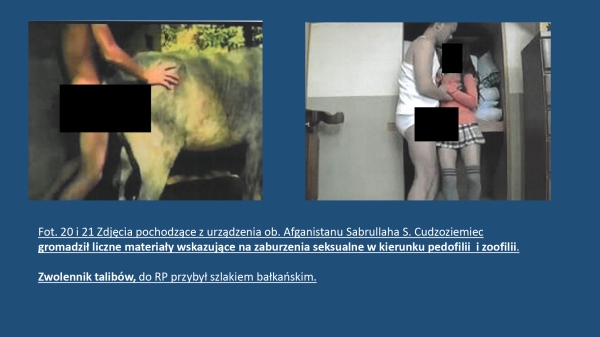
Note on the first image: Photos 20 and 21 were taken from the phone of Afghan citizen Sabrullah S.The foreigner had collected numerous materials indicating sexual disorders related to pedophilia and bestiality. The person is a supporter of the Taliban regime and arrived in Poland via the Balkan route.
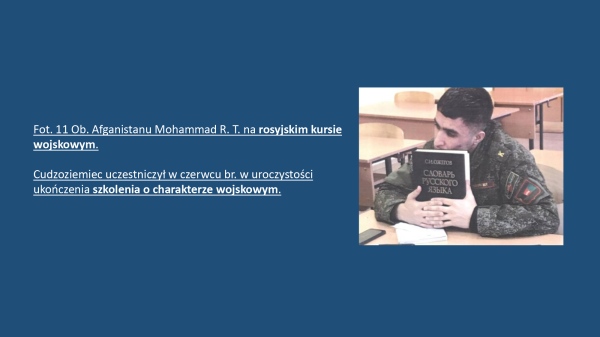
Note on the second image: Photo 11 shows Afghan citizen Mohammad R.T. participating in a Russian military course. A foreigner took part in the military graduation ceremony in June of this year.
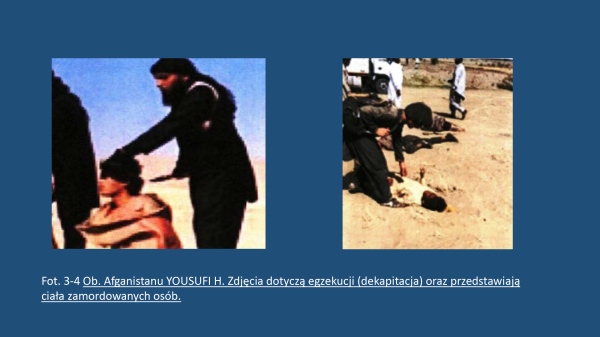
Note on the third image: Photos 3-4 were taken from the phone of Afghan citizen YOUSUFI H. These photos depict an execution (beheading) and shows the bodies of the dead people
Since then, the Polish government has maintained the position that refugees at this border pose a threat to national security, and has attempted to dehumanize them in order to prevent any empathy from society. This situation is deeply concerning as the lack of empathy and the adoption of a hostile stance towards refugees not only goes against the fundamental values and principles of a society based on human rights, but also leads to unacceptable actions such as the violation of rights, physical violence and discrimination.
The government's message has reached a large part of Polish society. According to a study carried by the Center for Public Opinion Research (CBOS, in its acronym in Polish), by the end of 2021, 52% of Poles were against allowing immigrants at this border to request asylum, while 66% supported the construction of a wall to prevent their passage. These statistics clearly demonstrate a lack of empathy and solidarity towards people who are fleeing war and persecution in search of a safe place to live. They also show the success of the disinformation strategy employed by the Polish government, which has managed to influence public opinion and generate a climate of hostility towards these refugees.
The majority of people attempting to cross the border between Poland and Belarus come from countries affected by war or high risk situations for their citizens, such as Syria, Yemen, Afghanistan and Iraq. Regardless of how they entered the country, they have the right to request asylum. Over time, other nationalities have joined this flow, including citizens of India, African countries, and even Cuba. However, regardless of their gender, age, or individual situation, everyone is at risk of being pushed back each time they attempt to cross the border. Unfortunately, some parts of Polish society continue to support the Border Guard, despite the inhumane treatment that refugees often receive at this border.
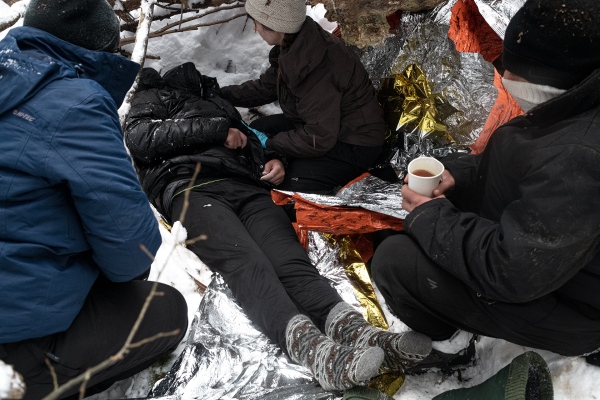
Photo: Two volunteers, one of them a doctor, provide assistance to Y.K (25 years old, engineer), a Syrian refugee in a state of second-degree hypothermia. December 12, 2022
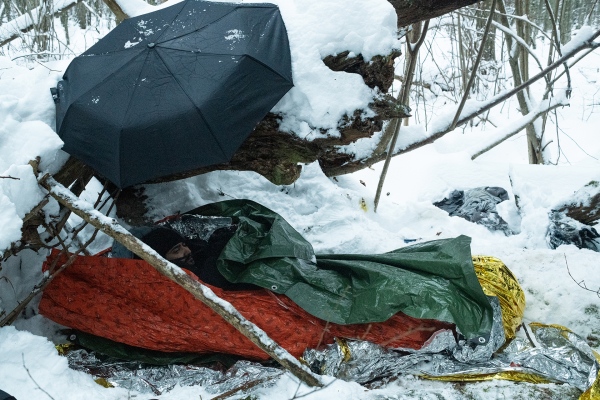
Photo: Y.K. waits for the ambulance to arrive. Despite the recommendation of a doctor that helped Y.K in the forest, he was never transported to the hospital but to the Border Guards post in Bialowieza. The Border Guards refused also the doctor to accompany them while transporting Y.K to the Border Guards post. December 12, 2022
STORIES FROM THE FOREST
“I don't care what country I get to. I just don't want to die here in the forest, you know?”
Mohammad, 50 years old, Syria
Akram (32 years old, Yemen, an oncologist) and Mohammad (50 years old, Syria) have been in the forest for 5 months. For several days they had to drink water from the swamps, filtering it through a scarf. The first question Akram asked us was: "Can you take us with you?" We had to explain to him that we couldn't do it and that transporting them in a car could cost us 8 years in prison for human trafficking. Both were exhausted. It is very difficult to leave a person in such a situation in the forest, especially at night. The next day, they asked for more help. Another team brought them more food and it turned out that Mohammad had a broken rib. According to my sources, some locals helped him cross a section of the forest and a few days later we found out that they were both safe in Germany.
The Bialowieza Forest is a very difficult place to traverse and survive, especially for people unprepared for harsh North East European climate. It is a protected space, full of swamps and tree falls, where crossing 1 km stretch takes much longer than in a normal forest. However and despite the fence, this route is still considered safer and easier to reach Europe, even if migrants often do not know what type of forest they will have to go through and comes unprepared. Most of them do not want to stay in Poland, but hope to reach Germany or another European country. In general, they come without knowing that, according to European law, if they want to apply for asylum they must do so in the first country of the European Union where they set foot. If caught by the Border Guards, some ask for asylum even if they want to go to another country. Otherwise the Border Guards would throw them back into the forest on the Belarusian side and they would have to cross the border again. Some remain trapped for months, suffering pushbacks as many as a dozen times, exposed to extreme conditions, lack of clean water and food, and in winter, to high risk of death from hypothermia.
Read more
Photos and text: Hanna Jarzabek
Photo: Akram and Mohammad receive help from volunteers, The Bialowieza Forest, October 23, 2022
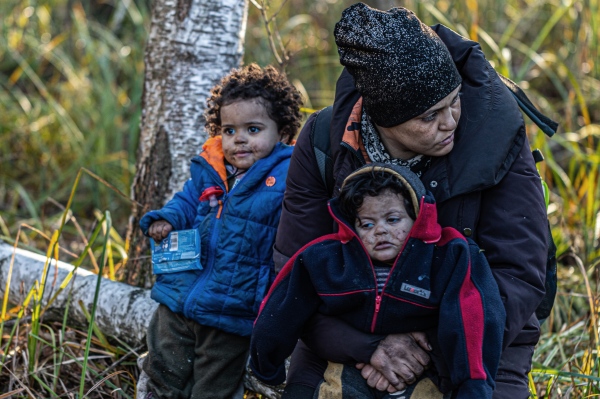
Stories from the begging of the crisis:
October 31, 2021, beautiful autumn sunrise. My husband and I are going to take pictures of nature. We are heading to the areas where we met moose, wet meadows right on the border of the strict reserve of the Białowieża National Park. Looking around for the dark silhouette of the animal, we notice movement among the trees....
Photo and text: Eliza Kowalczyk
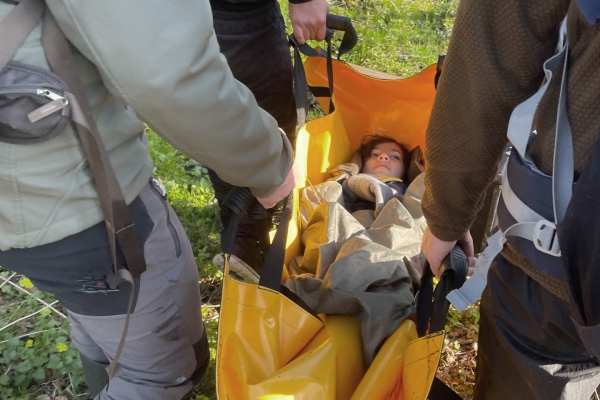
Stories from the begging of the crisis:
April, 28, 2022 - I knew that I was going to a father with a sick child. The mere thought of what condition I would find them in and whether I would be able to help them adequately aroused great fear in me. Father and daughter camped under the spruces at the High Marsh. He was terrified at the sight of me, but kept his composure and anyway had no way of escaping because the baby lay motionless under the sleeping bag. The girl didn't even flinch.
Photo and text: Eliza Kowalczyk
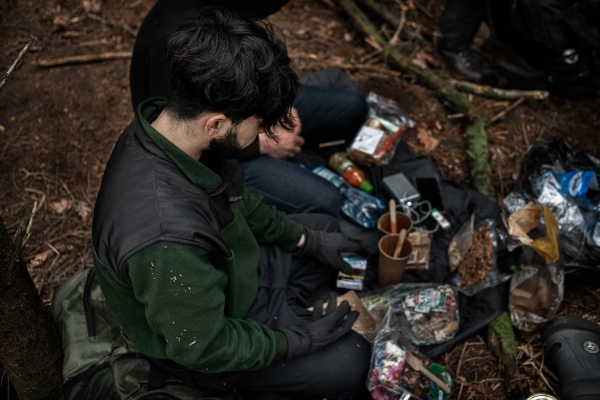
Ali (24 years old) was in a group of 8 people, all from Syria. He was very tired and, as we understood, he had not eaten or drunk for 6 days. The Border Guards had detained him already seven times and each time he was pushed back into the forest on the Belarusian side....
November 1, 2022Photo and text: Hanna Jarzabek
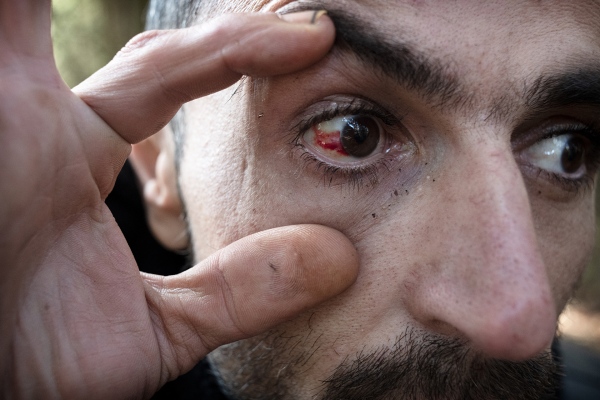
Mohammad came from Yemen to Russia and then to Minsk with his two friends, Khalid and Salim, the later both 23 years old. They had been in the forest for two months, and had already been pushed back to Byelorussian side twice by the Polish Border Guards...
November 4, 2022Photo and text: Hanna Jarzabek
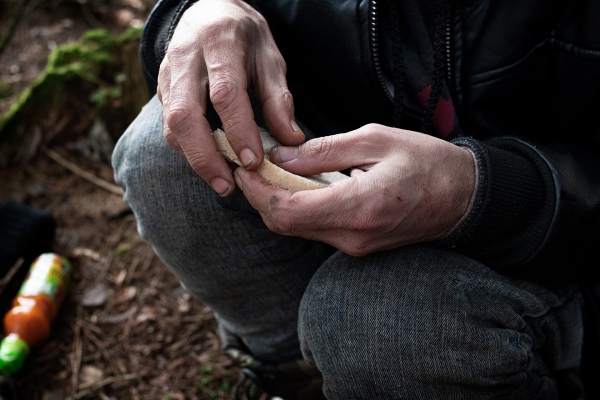
Most of the migrants do not want to stay in Poland, but hope to reach Germany or another European country. In general, they come unprepared and without knowing that, according to the European law, if they want to apply for asylum they must do so in the first country of the European Union where they set foot....
November 4, 2022Photo and text: Hanna Jarzabek
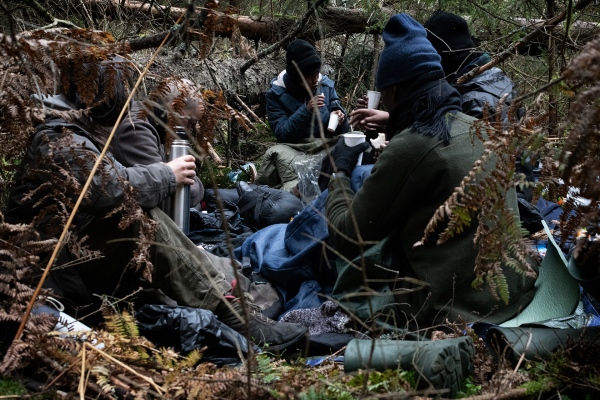
This group of five refugees from Eritrea have crossed the Polish-Belarusian border for the first time after traveling from Minsk to Moscow. It has become increasingly common for migrants to enter Moscow with tourist or study visas before organizing transportation to Minsk and then crossing the border into Poland. Since the summer of 2022, there has been a shift in the origins of refugees, with more individuals arriving from Africa, India, Pakistan, and even Cuba, in addition to those from the Middle East.
November 1, 2022Photo and text: Hanna Jarzabek
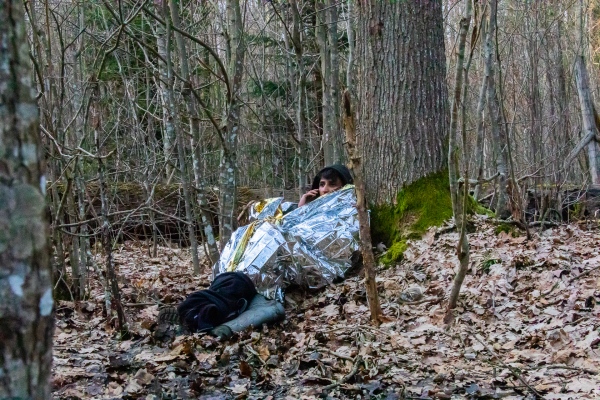
On a chilly March afternoon, two men—one from a nearby village and the other from a tourist destination—went to see the wall up close. Upon returning, they stumbled upon a 20-year-old Syrian man lying on the road, just 300 meters from the border dam. He appeared resigned and was shivering from the cold. He was soaked and freezing, and explained that he had fallen into a swamp. Wearing wet clothes and rubber boots without socks, he couldn't keep up with his companions, who had left him alone. With no cellular coverage or internet access, he didn't know how to seek help. As time passed, he grew colder and colder.
March 2, 2023Photo and text: Eliza Kowalczyk
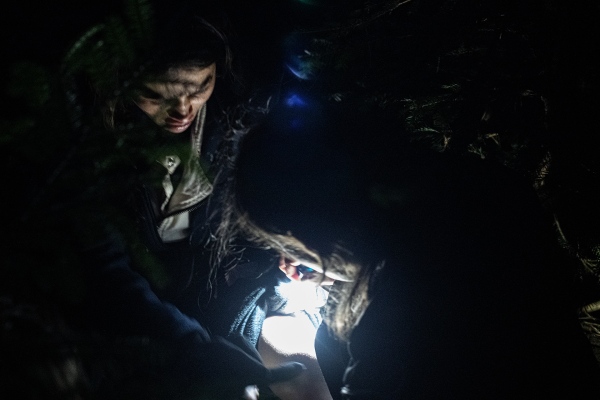
Fatima (name changed, 30 years old from Iran) participated in protests in her country and was subsequently placed on the country’s blacklist. She traveled with her husband and a friend. They were pushed back once and the second time, the Polish Border Guard subjected them to physical violence and pepper spray. Fatima lost consciousness and was transported to the hospital while her husband and friend were pushed back to Belarus….
March 18, 2023
Photo and text: Hanna Jarzabek
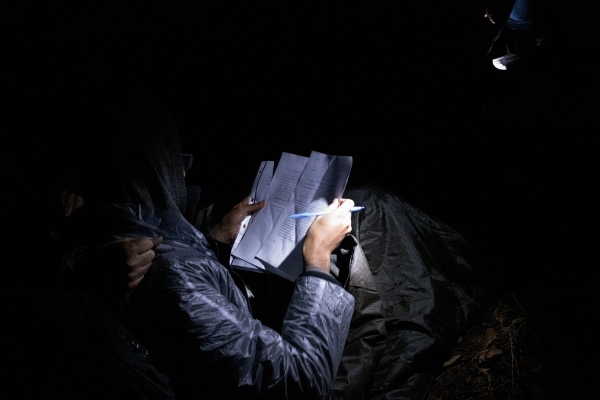
Night interventions are usually even more complicated because there is more risk of being discovered. Going towards the refugee hideout, at one point we heard a car and one of us saw lights in the distance. At this time in the middle of the forest it could only be the Border Guard. We fall to the completely wet ground and hide our faces among the foliage, thinking that if they have thermo vision, we are lost...
October 23, 2022 Photo and text: Hanna Jarzabek
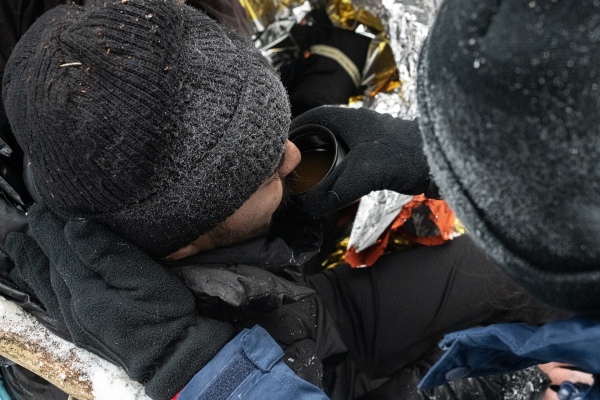
Y.K. a 25 years old engineer from Syria, for several days had been hiding in the strict reserve of the Bialowieza Forest, a place very difficult to access. According to the doctor who accompanied the volunteers who helped him, he was in the second degree of hypothermia....
December 12, 2022 Photo and text: Hanna Jarzabek
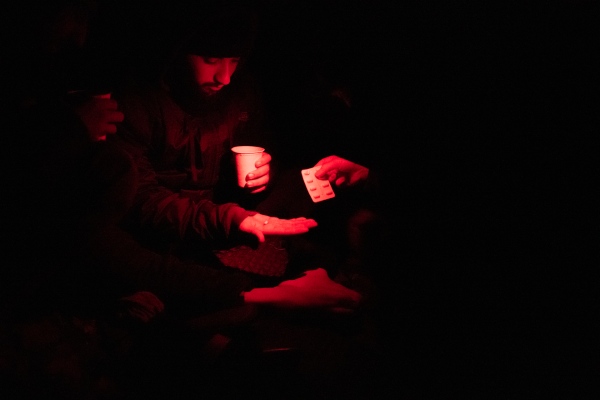
Unfortunately there are not many doctors on this border, and in their absence the volunteers have to provide aid without being prepared for it. In addition to hypothermia, now with the wall some of the injuries can be very serious, such as broken legs or ribs...
November 2, 2022 Photo and text: Hanna Jarzabek
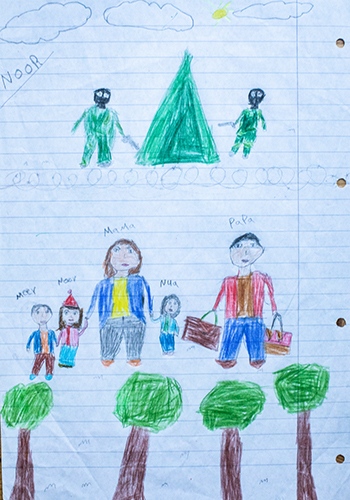
Drawings by Nua and Noor, two Kurdish children from Iraq. Along with their parents, they made their way to Minsk, where they initially slept in a park. They arrived at the Polish-Belarusian border between November and December 2021, where they were taken by Belarusian soldiers.
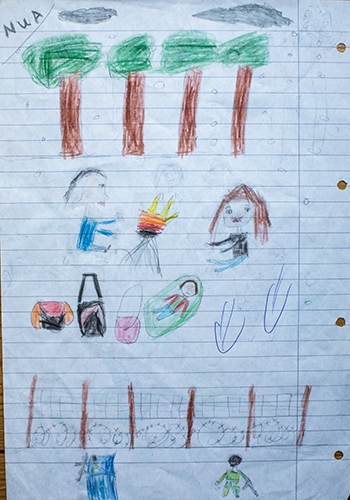
The Belarusian soldiers intimidated them, forced them to behave aggressively towards the Polish officials, and physically assaulted them. The family spent approximately 10 days sleeping in the forest at the border. They have since reached safety in Germany.
PROBLEMS WITH ACCESS TO MEDICAL HELP
Photos, audios & texts - Hanna Jarzabek
Since the beginning of the crisis, the Polish government has made it difficult to access humanitarian aid, and volunteer doctors who have tried to help faced significant resource limitations. Additionally, for the first 10 months, the border area was hermetically closed, preventing humanitarian organizations and journalists from accessing the region. Although this ban has now been lifted, no significant humanitarian activities have been initiated by large organizations in the area. Polish Humanitarian Action has established only one warehouse in Białystok, located 80 kilometers from the border, where informal groups can collect clothing and basic items for refugees in the forest. Doctors Without Borders is the only organization employing a few people to intervene in the forest, along with volunteers from informal groups. However, they do not have a base or camp, as is usually the case in similar situations in other countries. Moreover, calling an ambulance in the forest is equivalent to alerting the Border Guard, which leads to the detention of the refugees.
The most frequent medical problems are related to the harsh conditions in the forest, where refugees often spend long periods of time. The lack of drinking water and the need to drink swamp water contaminated by animals, often cause serious digestive problems and diarrhea. Trench foot (as shown in the photo opposite) is another common problem among migrants who spend days, sometimes even weeks, in a humid environment, passing through swamps and rivers without being able to change their clothes or to clean themselves. In summer, many suffer from dehydration, while in winter they suffer from hypothermia.
Doctors who provide help in the forest do so in harsh conditions, often at night, without being able to use light or tools to make a proper diagnosis. Many times they have to adapt the treatment to the conditions in the forest, even in cases as drastic as a natural miscarriage.
After the construction of the wall, various types of fractures are now added to all these problems, as people trying to climb over the wall sometimes fall from heights of up to 5 meters. Some of the fractures require complicated operations and months of recovery. In these cases, as well as in cases of hypothermia, the only solution is to call an ambulance, knowing that the migrant will be arrested and watched by the Border Guards during their hospital stay.
According to what several interviewees told us, there were situations where some refugees, after finishing their stay in the hospital, were transported by the Border Guards back to the forest and forced to cross the border to the Belarusian side, and the story started all over again from the beginning.
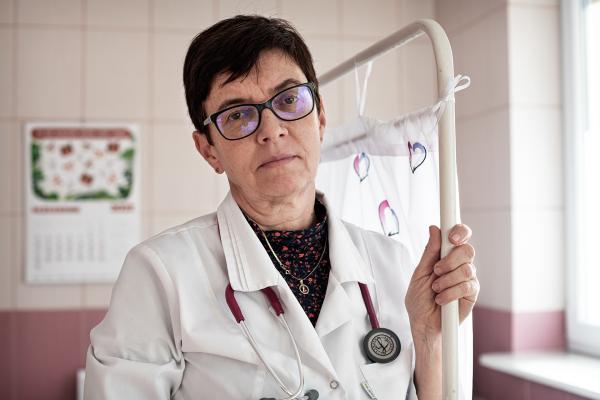
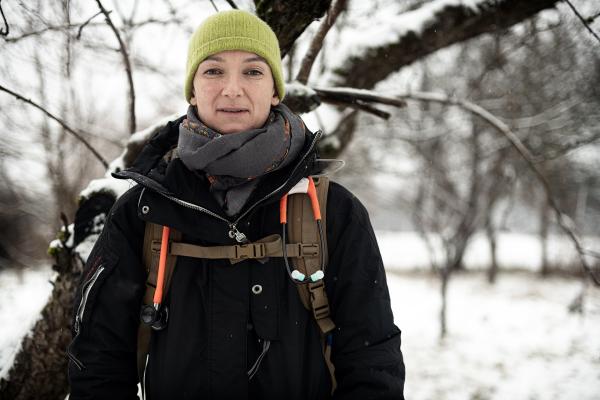
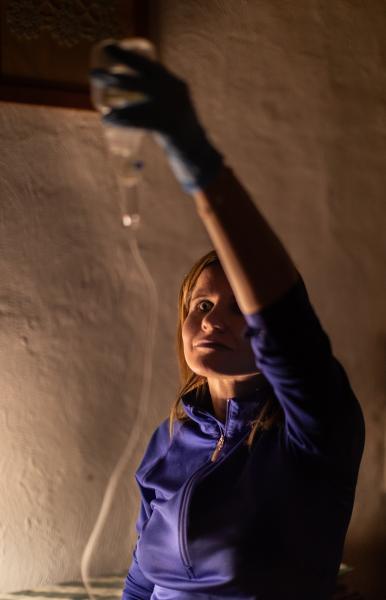
Update Required
To play the media you will need to either update your browser to a recent version or update your Flash plugin.
PODCAST (polish) - LUCYNA MARCINIAK
doctor of the Commune Health Center in Białowieża
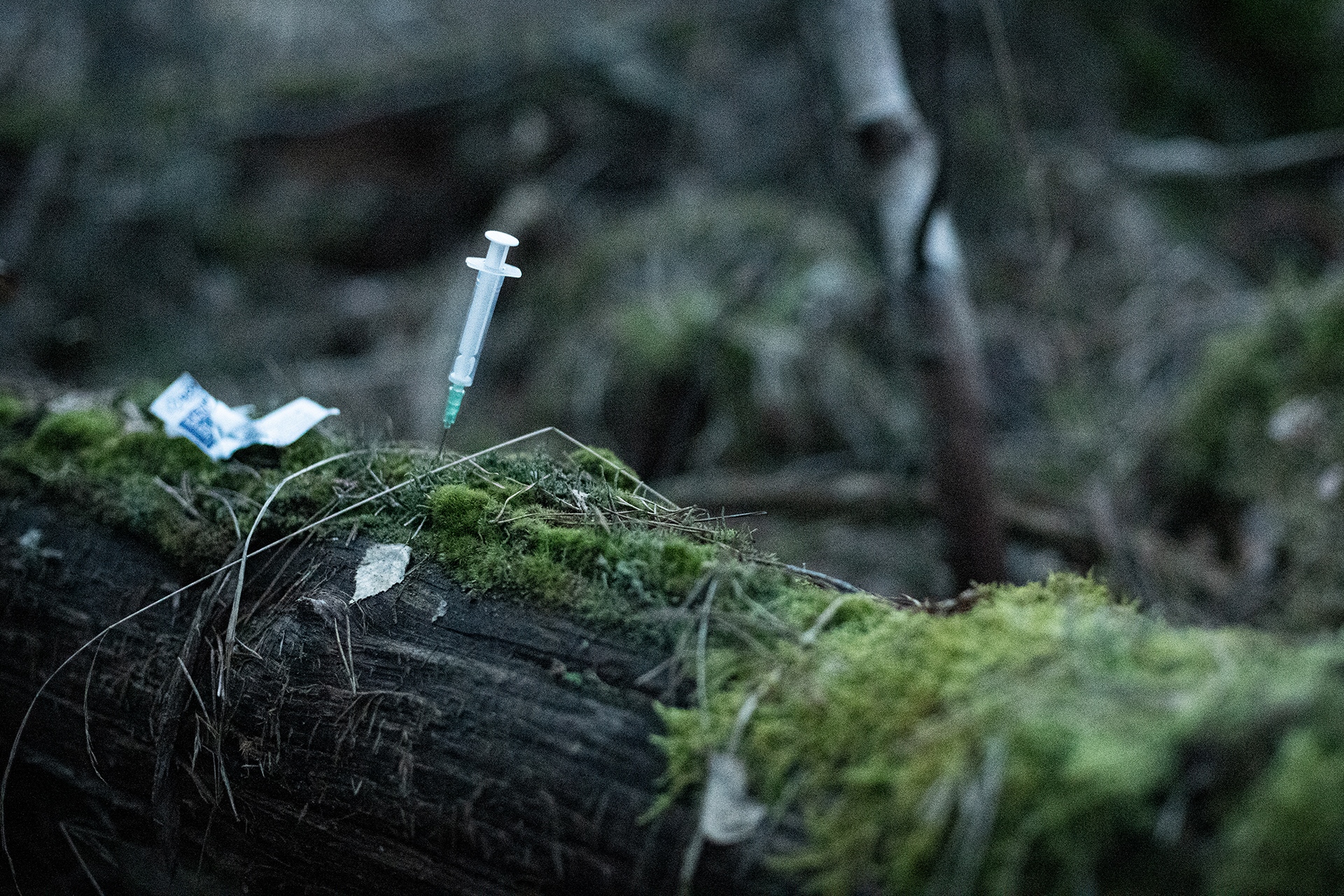
Photo: An injection that a rescuer had to give to a woman from Iran during the intervention in the forest. March 18, 2023
Interview with Ola G.,
a rescuer helping refugees in the Bialowieza Forest
“Most of the women who crossed the border reported being in early pregnancy and believed that it would protect them as pregnant women often afford more protection in many cultures. Unfortunately, this is not the case at the Polish border, as even those who report being pregnant are often pushed back. (read more about push backs)
I once helped a woman who was already quite far along in her pregnancy, probably in her third or fourth month. I have visited this group in the forest several times. The group consisted of a married couple, likely from the Congo, with their two children - a three or four-year-old girl and a seven-year-old boy. At one point, when they were preparing to move on, the woman's water broke and she started miscarrying. I stayed with her from beginning to end, connecting her to a drip, giving her painkillers, and waiting until the miscarriage was over, with the children and her husband by her side. Since there was no way to separate them, they were all aware of what was happening.
I knew that I would be with this woman, and I was prepared to call for help if her condition worsened, such as if she experienced uncontrolled bleeding. However, I also knew that if I had called an ambulance, the woman would have been hospitalized, but her husband and children would not have been allowed to stay with her. Given that this family had been pushed back several times before and that it was their third or fourth attempt to cross the border, I’m pretty sure that they would have been separated, and the husband and children would have been pushed back to Belarus without the possibility to request asylum. I knew that separating them could have meant that they would never be reunited.
Such situations happen when families are separated and pushed back to Belarus, and that's why we decided not to call an ambulance. We chose to stay with this woman and see how things developed. We took care of her during this time and when miscarriage was over, they went on their way.” - Ola G.
Update Required
To play the media you will need to either update your browser to a recent version or update your Flash plugin.
PODCAST (polish) - Ola G.
Rescuer helping
refugees in the Bialowieza Forest
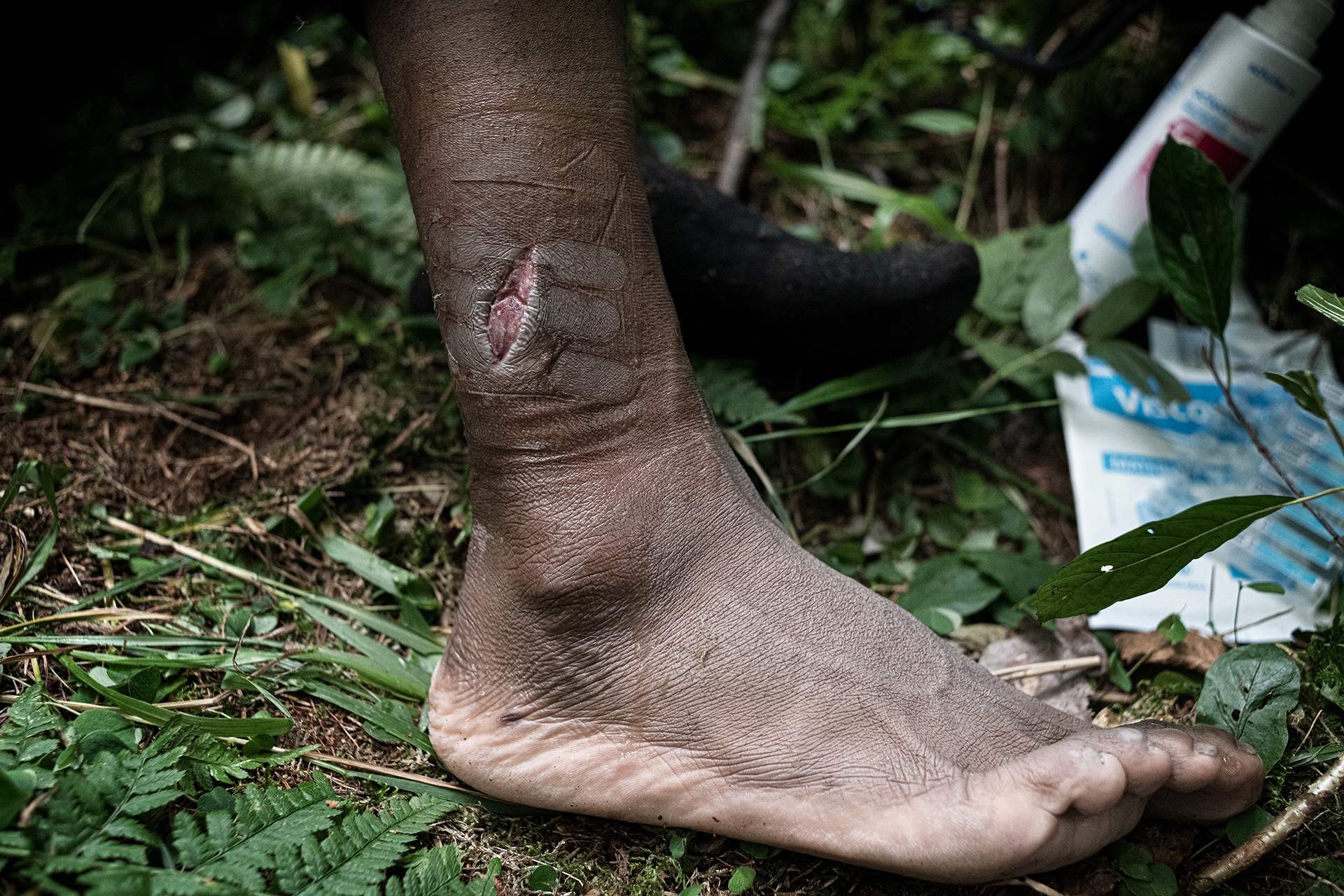
Photo: A refugee from Senegal shows the injuries caused by concertina blades after climbing the fence across the border. August 21, 2022
Kasia Poskrobko (43 years old) has been interested in what was happening at the border from the very beginning. She applied to the Granica Group as a volunteer and went through several online training to learn how to help in the field. She went to the forest a few times, but she decided to focus on helping refugees in the hospital because she lives very close to the hospital and saw firsthand how much help was needed there.
She volunteered for 10 months, during which the border zone was hermetically closed. In July 2022, as the crisis at the border had not abated and the newly erected wall resulted in more migrants suffering serious injuries, the need to keep her working at the hospital became obvious. To enable her to continue her work, Kasia was hired by the Egala Association as a Hospital Caseworking Coordinator.
Her duties include ensuring that each refugee receives the right information, is properly treated, and has access to basic necessities such as clean clothes and telephone. The Egala Association also covers the costs of medicines, which Kasia often has to buy after the patient is discharged from the hospital. Currently, due to the construction of the wall, there are additional costs of orthoses and orthopedic crutches, as an increasing number of migrants with broken limbs are hospitalized.
As a proxy, Kasia also follows the fate of patients after they are discharged from the hospital. On the one hand, she ensures that they are not thrown back into the forest on the Belarusian side. On the other hand, she monitors their situations and needs during their detention in the Centers for Foreigners.
“In the beginning, everything was organized in a hurry. As soon as Grupa Granica learned that a migrant needed hospitalization, which always involved the presence of the Border Guards, they tried to reach the place where the refugee was arrested as soon as possible and in a large group. Sometimes they even managed to bring some media with them because the most important thing was to ensure that the person would indeed be admitted to the hospital and that no one would throw them back into the forest. It was a bit difficult, a lot of confusion and stress, which did not help in the hospital since there were sick people there and the doctors themselves felt overwhelmed by the situation. Therefore, an idea emerged to establish a basis for more organized cooperation between the hospital and volunteers who help refugees. The volunteers could bring all their acquired knowledge, they had access to interpreters, and could assist in organizing clothes for refugees since it was also frequently needed. A hospital group was created, and due to the number of patients, volunteers had to take turns visiting them….. continue below
Photo: Kasia Poskrobko at the hospital where she assists refugees. December 18, 2022
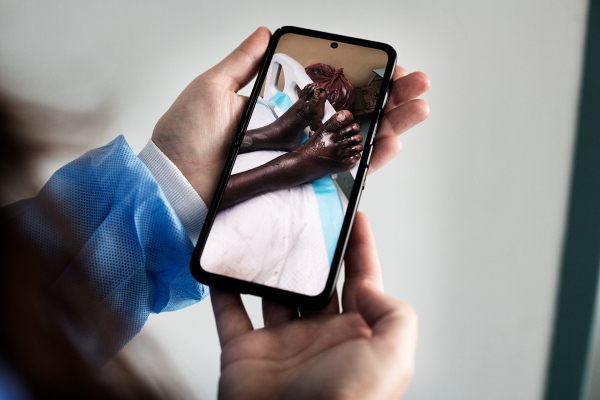
Photo: The most common injuries suffered by refugees trying to cross the border and the forest; here a frostbitten feet. December 18, 2022

Photo: Since the wall was built many fall down from the structure and break their limbs. December 18, 2022
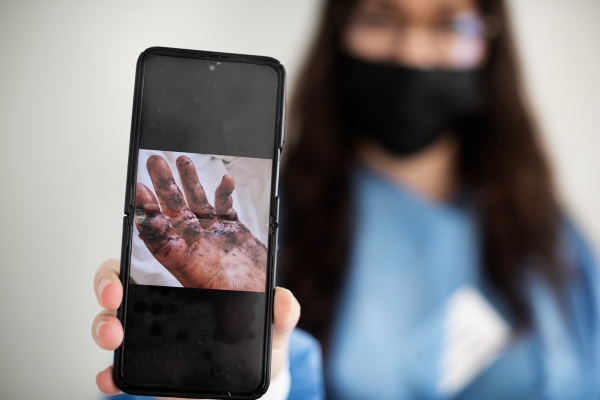
Photo: The most common injuries suffered by refugees trying to cross the border and the forest: here razor wire wounds. December 18, 2022
“Thanks to the fact that the hospital agreed to this cooperation, we had the opportunity to reach these people, explain their situation, offer help, ask if they want to apply for international protection and sign the power of attorney. This is a document that we have in many languages: Persian, Kurdish, English, French, and Arabic, which authorizes me as a proxy to receive information, access medical records, or handle administrative matters. Without this, these migrants, after being discharged from the hospital and picked up by the Border Guard, could be pushed back to the Belarusian side. They would simply disappear, and no one would be able to find out what happened to them.
Sometimes we do very basic things in the hospital. We help the nurses with this first interview with the patient, mainly because we have a list of interpreters who can be called quite quickly and are able to conduct the interview efficiently. We also organized a warehouse of things for refugees in the hospital because those people who were brought from the forest, where they often spent a long time, had dirty things, often soaked, and often only suitable for burning. Some pants were cut up, spilled with blood, etc. We always ask patients what to do about it. Usually, they themselves say to throw it away, but sometimes someone wants to keep something, probably because it's all they have left of their country and home. Then I would just take it home, and wash these jackets, clothes, even underwear, everything they had. Once, when I was taking one man's clothes to throw away, he took something out of his pocket, a bundle, a prayer I guess. He kissed it and hid it, saying that I could throw away the rest. Sometimes I have one evening to do it, so I quickly wash, dry, and bring it back to the hospital. But sometimes I look at those hanging alien men's knickers in my house where I have a husband and a kid, and I think: this is all weird, kind of abnormal and crazy.
Once a situation happened to us, a young Syrian boy, 31 years old, fell off the wall and broke his leg while crossing the border. They brought him to the hospital, and among his belongings was a rucksack with the straps cut up. It turned out that the Border Guards had cut it so that he couldn't wear it anymore. There was also a situation in which a woman left the hospital in flip-flops during the winter. The Border Guards pushed her back to the border in the woods, and as we found out too late, we had no chance to bring her the right clothes.
Throughout the migrant's stay in the hospital, he is guarded by the Border Guards all the time. First, they sat in the rooms, now in the corridor. Unfortunately, they often make it difficult for me to contact the patient. They raise their voices, shout, and threaten me with the police. Sometimes they even try to snatch the papers that I am signing with the migrant from my hand. They don't like it at all that some documents are signed with refugees.
These are very difficult moments. On the one hand, I have never been a fighter, and here I must have enough strength to oppose such a Border Guard and remind him that every patient, regardless of origin, skin color or how he crossed the border, has basic rights that must be observed. On the other hand, there are other patients around who see an authority figure and some scuffle, verbal or not, with me, and I do not know what they think about all this.Finally, there is this poor refugee who is often sore, after surgery, scared, and even if he does not understand everything, he is aware of the whole situation."
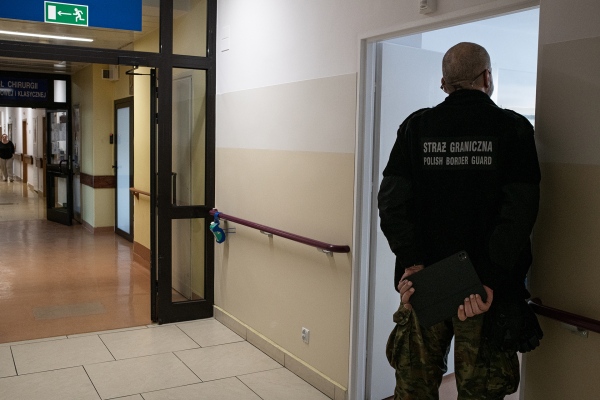
Photo: A Border Guard watch refugees hospitalized after being injured trying to cross the fence; December 18, 2022
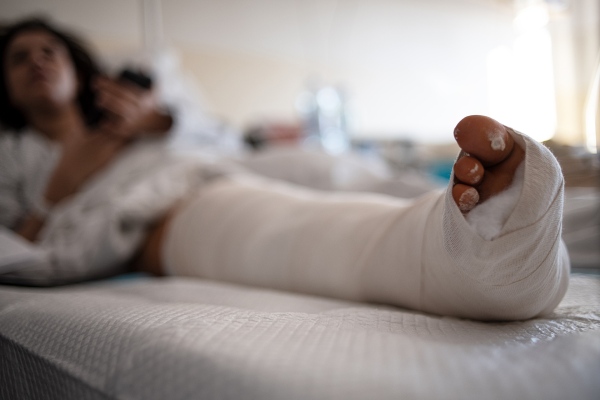
Photo: A. (25 years old, Yemen, wanted to remain anonymous) hospitalized after broking her leg while crossing the wall at the border; December 18, 2022 - read her story
"The Border Guards take everything from the migrants when they are stopped: phones, passports, and everything goes into storage. So, let's say a refugee is lying in the hospital after surgery, and he has no way to contact his family to let them know his condition or whereabouts. I give them my phone because I believe that patients have the right to contact their family. This is where quarrels with Border Guards often start. I always try to remain firm and calm, but when I leave the ward, I sometimes break down and cry in the corridor. I cannot stand how Border Guards treat these migrants. An officer shouldn't make people fear him. He can explain his duties, which include monitoring and ensuring the refugee does not leave the hospital. But that doesn't mean he should abuse his power, especially when the refugee is sick and bedridden and poses no physical threat or chance of running away.
The Border Guards’ approach to these migrants is very inhumane. Once, they brought a father with his 9-year-old daughter (read her story) who was seriously ill. The ambulance, of course, was escorted by the Border Guards, and the father was understandably scared. Suddenly, I heard one of the guards commenting to the nurse: "Oh, look how they put their own children in danger! What kind of a father takes his child into a forest and tries to cross the border like this?!” This father was fleeing a country where there was no help for his child, and despite working three jobs, he was unable to provide his child with proper medical care. But the officer did not try to consider why this man was in such a situation. Instead, he just mocked him and judged him negatively. All I could see was this father sitting in the ambulance, his knees shaking with terror.
Another time, while waiting for a doctor's appointment with my grandmother in the hospital, I saw a Border Guards van pull up. The back door opened, and a woman was dragged out by her legs. She wasn't sitting on a seat, and no one told her she had to get out of the car. They just dragged her out by her legs. I was in shock. I went out and told the Border Guards: "Gentlemen, this is not how you should treat a human!" And they told me that I had no right to interfere.
The only thing that comforts me a little is the attitude of the doctors. They sometimes go out of their way to help these people as much as possible. There is no distinction between a Pole and a foreigner, or how they crossed the border. They are simply patients who need to be treated.
I keep repeating: security does not exclude humanity. We want safe borders, we want a safe Poland, and that's good, but we also need to be human. These are people who need help and support. We need to respect their rights and our conventions as a state. I often hear people, whether they are Border Guards or just people I meet, say that these migrants crossed the border illegally, so they deserve what happens to them. But what about Poles who have been entering other countries illegally? Everyone is outraged that mostly men are trying to cross the border. First of all, it is not true. I've treated many women, and one pregnant woman just gave birth. Secondly, even if it was true, Polish families also send men abroad to work while women stay at home with children. There are no illegal people; there is one world that we should share." - Kasia P.
VOLUNTARY HELP FROM LOCALS
Photos, audios & texts: Hanna Jarzabek
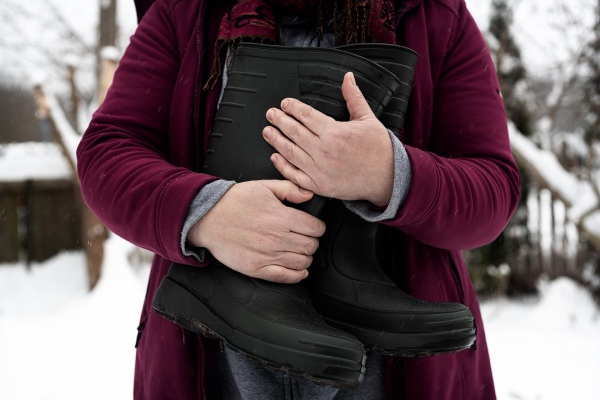
"For several months, we had such a deep conviction that, because there was the so-called state of emergency and no one from the outside could come here, neither any institution or humanitarian organization that should take care of these people in such situations, we had a deep conviction that absolutely everything: life and health of these people is solely in our hands and depends solely on us. It was really depressing because it was a sense of responsibility and helplessness at the same time, terrible. It really paralyzed a lot of us. It was really hard to do anything else back then."
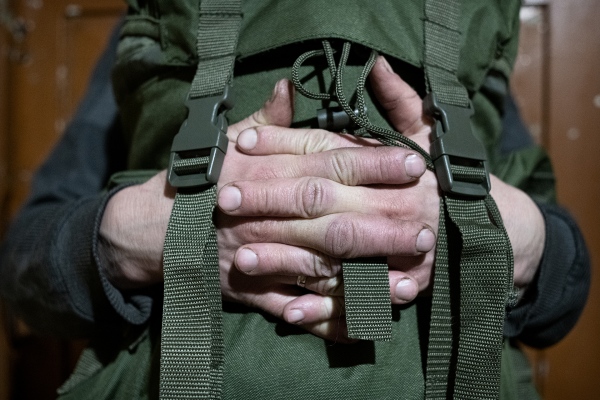
"I've seen soaked, cold children who just cried. I saw a woman who was shivering from the cold and crying. It was early November last year. It was really cold and there was a group that crossed the river. There were women and children there and the woman was just sobbing. It was obvious that she was suffering, that she was cold. And you remember things like that. Or situations where you can see how these people are hounded, for example, when I come to them and they grab my legs, beg me not to call the police. It's very sad that these people are just so intimidated."
Read whole testimony
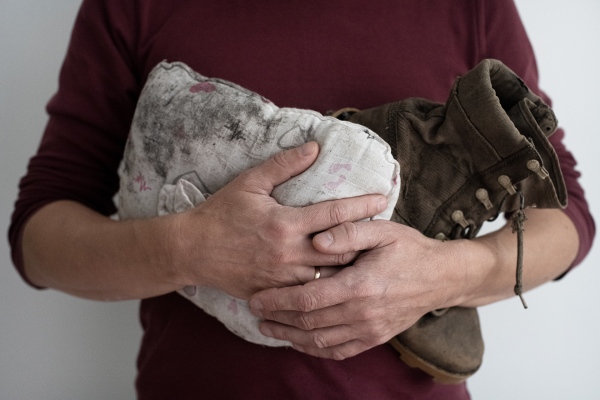
When the crisis on the border began, Przemek (name changed) started going to the forest with a few friends to help. Once they found a group of refugees and realized that three of them had health problems: one had heart problems, another was over 60 and showing signs of exhaustion, and the third had a serious leg injury. "We called an ambulance and it arrived but due to the pandemic, they could only take one person. The man with the injured leg was the one taken. The man with heart problems was not examined, and nobody even looked at the one who was 60 years old. The latter started crying. I don't know what happened to them, the Border Guard took them, and I can only imagine the rest."
Update Required
To play the media you will need to either update your browser to a recent version or update your Flash plugin.
PODCAST (polish)
G., local inhabitant who used to help refugees in the forest
Since the beginning of this crisis (autumn 2021), the Polish government has penalized any humanitarian aid to refugees at this border (read more about the penalization), treating those who provide it as "idiots and traitors". For this reason, most of the local people or volunteers who have been helping in the forest prefer to remain anonymous, not only for their safety, but also so that they can continue to help and not put the refugees at risk.
For 10 months, the border area was closed and no one, neither humanitarian organizations nor journalists, could enter. Local people started helping the refugees without any prior preparation or psychological support. They felt abandoned thinking the lives of the refugees depended only on them. After a year and a half of the crisis, many suffer post traumatic syndrome, feel angry and without hope that anything will improve in the future. The long months of confinement have exhausted them and now, although they can go in and out of the border area, they continue to feel abandoned as they see nothing has really changed. The wall was built but the refugees continue to cross the border and help in the forest is needed as much as at the beginning of the crisis. However there is no adequate nor efficient systemic response and all the help provided to the refugees continue to be informal and clandestine.
In the region there are several informal groups that have been helping refugees clandestinely since the beginning of the crisis. One of them, the biggest and best organized, is Grupa Granica, which includes several associations, local inhabitants and volunteers coming from other parts of Poland and foreigners.
In July 2022, the state of emergency was lifted, but NGOs were hesitant to establish bases in the region to provide assistance. On the one hand, the Ukrainian refugees monopolized all the attention, and on the other hand, the authorities make any type of intervention very difficult on this border. Currently only Doctors Without Borders employ medical and rescue personnel (read more about access to medical help) to work in the forest together with volunteers from informal groups. Calling an ambulance or requesting official assistance is equivalent to the arrival of Border Guards and the arrest of the refugees.
The volunteers bring clothes, food, medicines (if necessary) and sometimes also SIM cards or power banks for telephones. Many times, the refugees have wet clothes and shoes from having crossed swamps or rivers. Sometimes, if there is an emergency, the volunteers have to provide help in the middle of the night, reaching places with very difficult access. In general people do not speak openly about help they provide, especially when it goes beyond the basic things such as food and clothes. Those who give shelter to refugees at home try to stay as anonymous as it is possible. However, the villages in Podlasie region are small and any behavior out of the ordinary attracts attention. P., a woman who hosted two refugee families in her home (read her story), told me that she became afraid when the shop assistant started asking her a lot of questions and making comments such as: "You buy a lot of bread lately… I didn't know you liked canned fish so much, you never bought it before.” She realized she had to get the refugees out of her house because she couldn't be sure someone wasn't going to call the Border Guards and turn her and the refugees in.
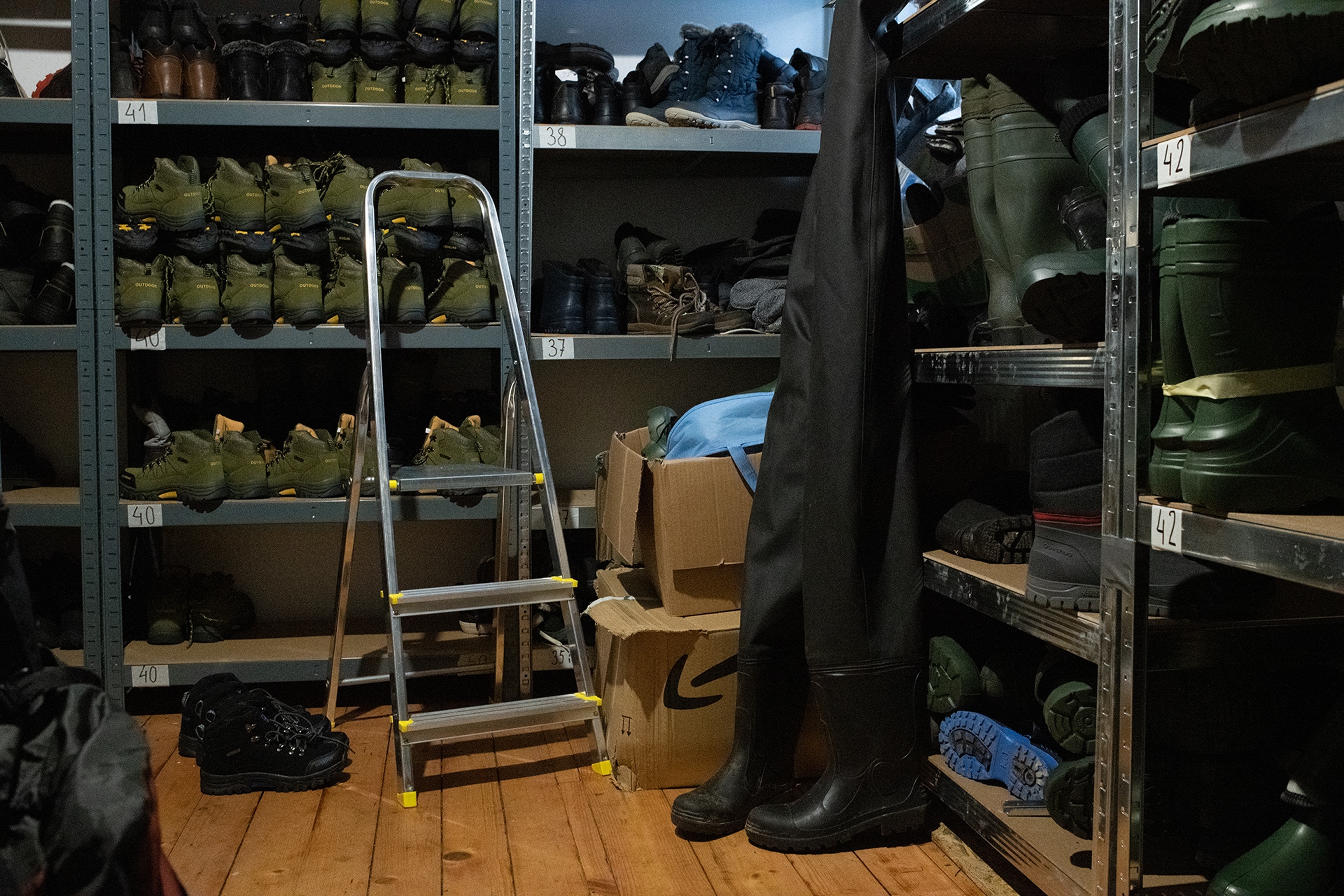
Photo: One of the warehouse set up by volunteers with the support of civil society and various associations (both Polish and foreign); December 11, 2022
Update Required
To play the media you will need to either update your browser to a recent version or update your Flash plugin.
PODCAST (polish)
G.K, local inhabitant who used to host refugees in her house
"In April, I discovered two families in the forest just six kilometers from my house. There were four children, including a two-year-old toddler and a girl just a bit older than him. I found them quickly, as I was familiar with the area. When I arrived, I saw a young man kneeling in terror and begging me not to call any services. Behind him were the children, all displaying the same fear and terror that he had. There were three adults present, as well as a 13-year-old girl and a 14- or 15-year-old boy. The same fear was reflected in the children's eyes, which made the moment even more difficult for me.
I learned that they had been pushed back 31 times and had been on the border since October, including in Bruzgi camp. The wife of the man from the older family, those who had three children, also made a strong impression on me. When I arrived, volunteers were giving them soup, but the woman just sat on the side, showing no emotion. It was as if she had no hope left and knew that they would be caught and deported soon anyway. The terror in their eyes and the fear that I might betray them were the most affecting things of this experience.
After going through all these situations, I’m not sure if I’m ready hosting in my house someone in need again. The thought of it scares me, and I don’t know if I could handle it emotionally and mentally. The situation of the last person who showed up at my house pushed me to my limits, and I felt like I was going crazy. It’s much easier for me to go to the forest and bring help than to have someone stay at my home. I can't imagine what would happen if I was put in that situation again. It was all too intense and overwhelming for me, and I don’t know if my hypersensitivity plays a role in it.
However, I feel capable to go to forest and help there. I refer to keep it that way and not have anyone come to my house. I know it sounds cruel, but it’s a matter of self-preservation. This past year has been line a nightmare, and I can’t accept that my paradise on earth has turned into a hell." - G
Informal initiatives helping refugees on the Belarusian border:
Crisis Intervention Point - Catholic Intelligentsia Club
Foundation Ocalenie
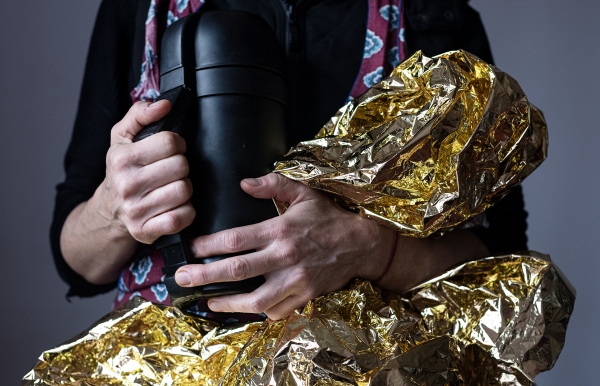
A. is an anthropologist and lives outside of Podlasie region. She had never been particularly interested in the issue of migration before. When the crisis started in Podlasie, it was her daughter (then 19 years old) who got involved first, starting with preparing food and then going into the forest to help. A. used to listen to the stories her daughter told her and finally decided to enroll as a volunteer too.
P. (a mother of 10 years old boy) had been hosting two refugee families in her home, when a shop assistant’s curious questions sparked fear in her. The assistant’s queries about P.’s buying habits, such as why she was purchasing more bread than usual and why she had started buying canned fish, made her realized that her guests may be at risk. P. feared that someone might inform the Border Guard about the presence of refugees in her home. As a result, she decided that it was no longer safe for them to stay with her.
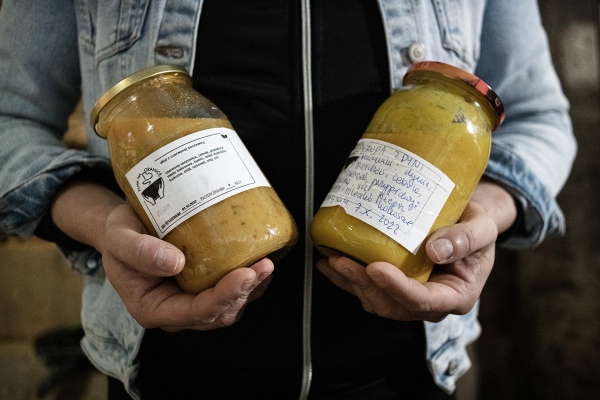
“From the very beginning, we knew we couldn’t trust the Border Guard because they do push-backs. I remember one group of Somalis consisting of nine teenagers and one adult who were detained. During their detention, one of the officers, who was unaware he was being recorded, said he would drive them to the facility unless he changed his mind.
At first, we met people who had travel insurance for their entire family. One family with children of different ages showed me such a document. They had purchased a package that included a trip with insurance, two or three days of sightseeing, which nobody did, and then a taxi dropped them off at the border line. They were told that the hardest part of their journey was ahead of them, which was a 15-kilometer walk through the forest. It was similar to the emigration of Poles in the past who went to Rome to visit the Pope and the Holy Land. In reality, they were heading to Germany and never planned to return.” - a married couple, both 54 years old, who help in the forest, hospital, and assist refugees in Centers for Foreigners.
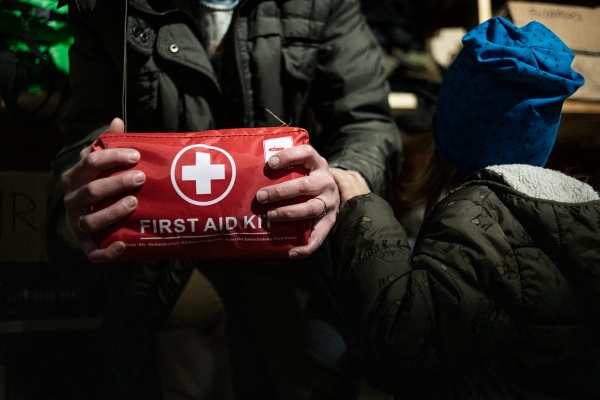
"One evening, around eight o'clock, my daughter says: someone knocks on the window. I go to that window and I see a young dark-skinned woman outside. I let her into the house and we began to talk. During our conversation, I learned that she had nothing with her except for two soaked Bibles and a handful of garbage. She didn’t have a phone, backpack, map or any way to contact anyone. When I asked her how she ended up in this situation, she told me that she had been crossing the border walking with five men. She tripped and hurt her leg.
The men left her behind because she couldn't keep up with them. As a very religious person, she began to pray and ask God fro help. I am an atheist, so for me it's an abstract situation. But she said she prayed to God to lead her to someone who could help her. As luck would have it, she saw the only house in the area with a light on and felt compelled to knock on the door. She said she heard a voice from God telling her to enter the house. Her faith and trust in a being that I personally don’t believe in left a lasting impression on me. I still get chills thinking about the experience.
PUSHBACKS AND CRIMES
Photos & texts: Hanna Jarzabek & Eliza Kowalczyk
Graphics: Hanna Jarzabek
Push-back is a term that refers to the “means” by which refugees and migrants are forced to return across borders, usually immediately after crossing, without regard to their individual circumstances and without the possibility of seeking asylum. This procedure violates many international legal arrangements, including the prohibition of collective expulsion of foreigners, contained in Convention on Human Rights
On the Polish-Belarusian border, push-backs are the order of the day. Instead of the procedures provided for in the law, the Border Guard uses deportations, throwing people over the border fence through the gates, which were theoretically intended to facilitate the migration of animals in the Bialowieza Forest. According to the response of the Border Guard to the request for public information, in the period from the beginning of the crisis until December 26, 2022, 50.668 pushbacks were documented. The question is how many were conducted without documentation? This is unknown. Refugees have reported being deported multiple times, sometimes even dozens of times. For those who cross the border and end up spending days or even weeks in the forest, every deportation represents a life-threatening situation. Being forcibly taken to remote areas, such as forests, swamps, or riversides, where they're stripped of warm clothes, phones, and other belongings, and often subjected to violence, is tantamount to a death sentence. When fleeing from authorities, groups of refugees may panic and scatter, making it hard for them to reunite, and leaving them stranded and vulnerable in the forest. Without any means of communication or access to basic necessities, they become increasingly vulnerable, making survival even more difficult. During the autumn and winter months, hypothermia can set in rapidly, leading to exhaustion and disorientation which can make it hard for them to be located or rescued, and many are never seen again.
According to the Geneva Convention, which is still in force today and Poland is one of the countries that ratified it: "No Contracting State shall expel or in any way return a refugee to the frontier of territories where his life or freedom would be threatened on account of his race, religion, nationality, membership of a particular social group or political opinion." The Lukashenka regime is in power in Belarus, where refugees are transported. This country cannot be considered safe, people are oppressed there, therefore transporting migrants and pushing them to this country is a violation of the provisions of the Geneva Convention.
Moreover, according to the testimonies of some refugees, it is also not uncommon for families to be separated during pus-backs.
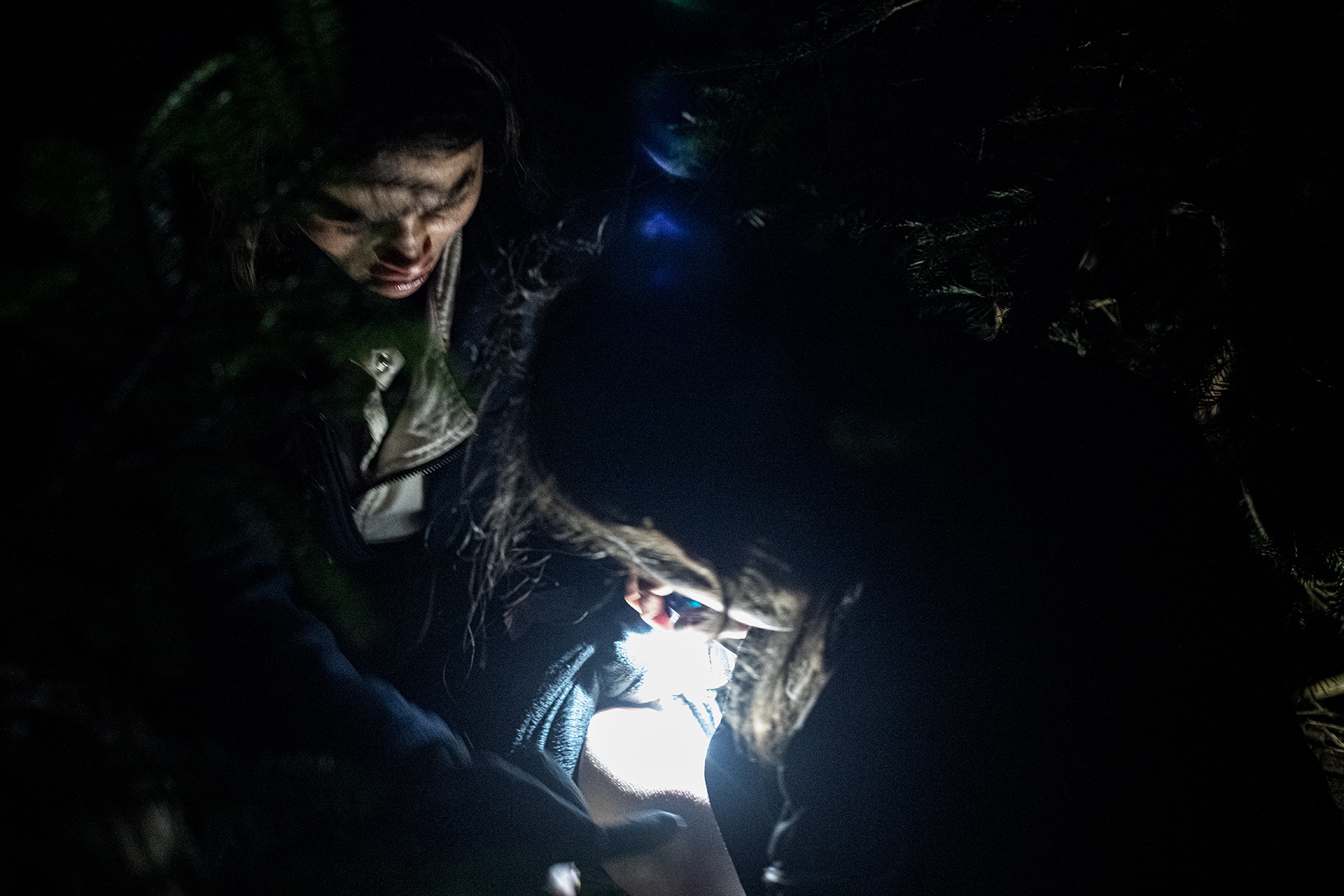
“I tried to cross the border with my husband and one friend. As soon as we managed to get to the Polish side, the Border Guard caught us and started beating us. They also used tear gas and at one point I fainted. I woke up in the ambulance, alone. They took me to the hospital and pushed back my husband and friend to the Belarusian side. I don't know when or how I'll be able to see him again."
Fatima (name changed, around 35 years old, Iran)
Photo above (H.J.): Another Iranian woman attended by a volunteer doctor in the Bialowieza Forest. March 18, 2023
The Polish government changed the immigration law to "legalize" pushbacks at this border. Officially, when Border Guards catch a migrant on Polish soil, if he does not express the will to request asylum, they "accompany” him back to the border. In such a case, and according to the changed Polish law the person should receive a formal and written decision to leave the territory of the Republic of Poland, which he should sign and receive a copy of it.
In reality, first of all migrants are rarely given the opportunity to apply for asylum, or sometimes these requests are simply ignored. Secondly, in a large majority of cases, refugees do not receive any document at all. From data provided by Border Guards, out of the 50668 persones returned to the border line by Border Guards, only 4924 received a decision to leave the territory of the Republic of Poland, which is slightly more than 10%. Moreover, some of the refugees who we have interviewed in the forest claimed to have suffered several of these push-backs, reaching numbers as high as 17.

Ali (24 years old from Syria) was very tired and, as he said he had not eaten or drunk for 6 days. The Border Guards had detained him already seven times and each time he was pushed back into the forest on the Belarusian side.
Photo (H.J.): Refugees’ clothes found in the forest. December 13, 2022
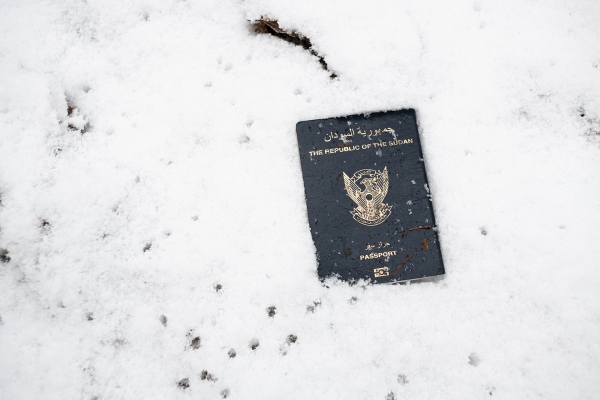
Mohammad came from Yemen to Russia and then to Minsk with his two friends, Khalid and Salim, the later both 23 years old. They had been in the forest for two months, and had already been pushed back to Byelorussian side twice by the Polish Border Guards. The first time The Polish Border Guards smashed their phones and sprayed teargas in their eyes. Khalid said he couldn't see anything for a couple of hours.
Read more
Photo (H.J.): Refugee passort found in the forest. December 7, 2022
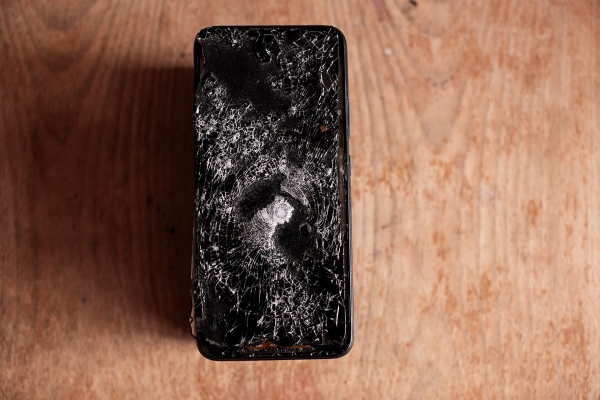
A. (25 years old, Yemen, wanted to remain anonymous) tried to cross the border with her brother and a friend. She slipped off the fence and broke her leg. Her brother tried to carry her on his back, but couldn't do it for a long time. They were detained by the Border Guards in the forest, A. was taken to hospital, while her brother and friend were probably pushed back to the Belarusian side.
Read more
Photo (H.J.): Smashed telephone found in the forest. December 9, 2022
Witness’ testimonies:
Eliza Kowalczyk: “On March 24th, around noon, I received information from a resident of Białowieża about a group of 10-11 people being stopped at the gate to the Strict Białowieża Forest Reserve. Reacting immediately, I got into my car and healed to the location to document possible breach of regulations. When I arrived, I saw there were already two off-road vehicles and an unmarked Border Guard bus on the scene. Unfortunately, before I could reach the site, the authorities had managed to pack the individuals into the cars, with two of them even forced to sit in the trunk. From a distance, I was able to observe and take photographs of the end of the incident, as the cars departed from the area.
The Border Guard Post, where refugees should be driven for administrative procedure, is located less than a kilometer away from where they were initially arrested. According to the law, the Border Guards are responsible for examining the data and documents of the refugees to inform them about their expulsion from the country and the ban on entering the territory of the Republic of Poland for three years. However, in this case, the Border Guard cars passed by the facility without stopping, and after approximately 30 minutes, they returned empty from the area of the High Marsh, which is frequently associated with pushbacks.”
Photo below (E.K.): Arrest of refugees by Border Guards at the entrance to the Strict Białowieża Forest Reserve. March 24, 2023
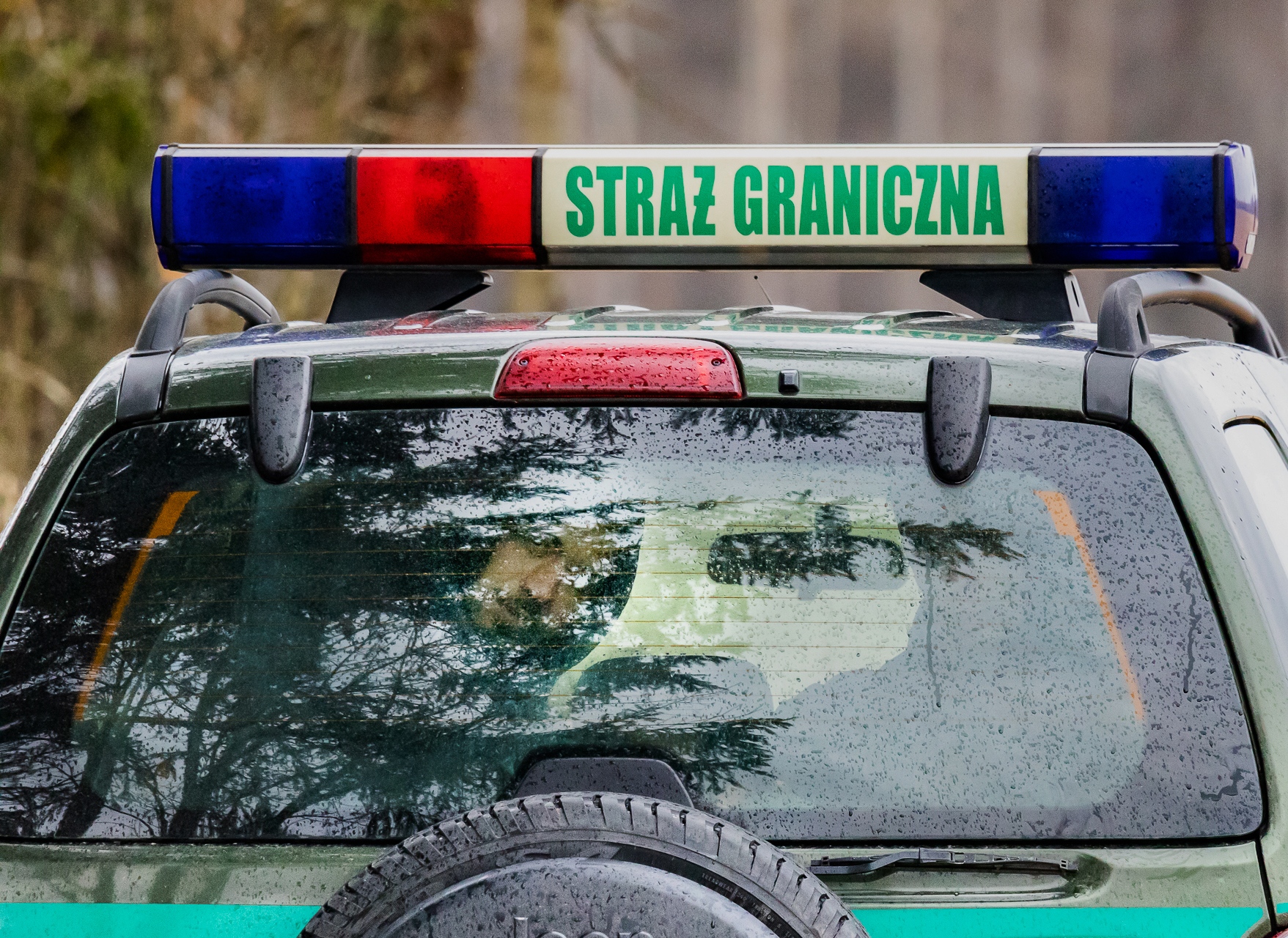
Grażyna Chyra, a resident of Białowieża and an eyewitness to the detention, stated that it was one of several instances of pushback, though it can be challenging to document such incidents. In cases like this, it’s impossible to trace the Border Guard vehicle that takes the detained persons in an unknown direction deep into the forest. Any attempt to inquire about the fate of these individuals from the officers are met with refusal to provide information under the pretext of data protection.
Grażyna Chyra: “I have reached the gate. I put on my ID (I have a guide license in the Białowieża National Park, BPN in Polish abbreviation). I wanted to go inside, but an employee of the Border Guard (SG) felt obliged to say that I couldn’t do it, because it would be a violation of the Strict Reserve. I couldn't help answering the lady from the Border Guard (who, exceptionally, had her face uncovered) that it was not her competence to let anyone in or not to enter the Reserve, and that her competence was only to observe the law at the border. It soon became clear to me why she had been so reluctant to allow me through the gate. Several dozen meters ahead, beyond the trail, I spotted a group of people. Additionally, two Border Guard personnel with covered faces and long guns were standing nearby. As I approached, they positioned themselves in a manner that blocked my view as much as possible. Using my binoculars, I could see seven men, one of whom was coughing loudly and frequently. It was apparent that the Border Guards were attempting to conceal the fact that they had apprehended migrants.
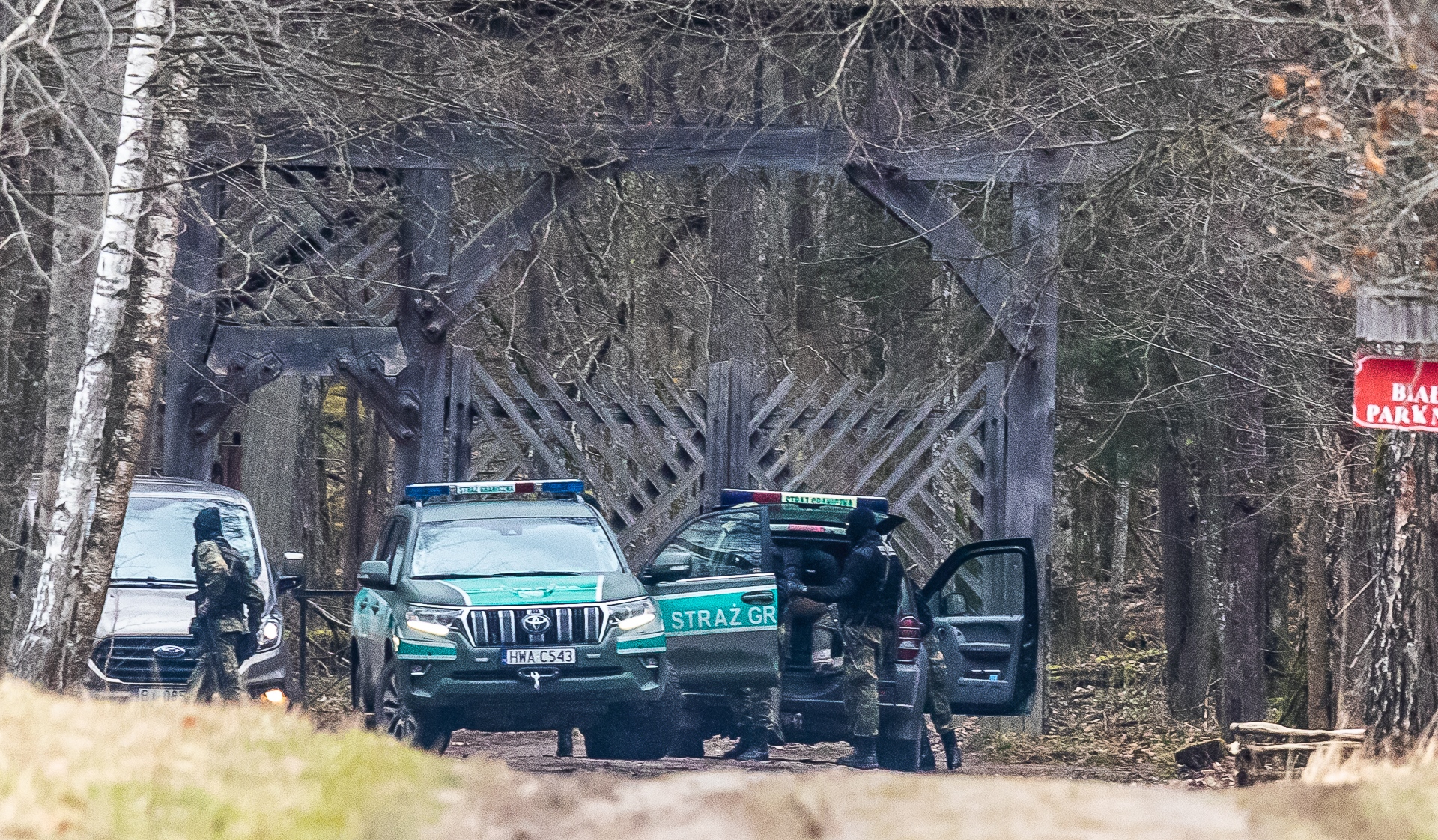
Photo above (E.K..): Arrest of refugees by Border Guards at the entrance to the Strict Białowieża Forest Reserve. March 24, 2023
After observing the situation for a few minutes, I decided to leave and wait outside the gate to monitor any further developments. Shortly after, two more Border Guards cars arrived, and the entire group of individuals (roughly 10-11 people, but it was difficult to discern accurately) was quickly packed into the vehicles and driven away. The question now remains: what are the chances that these people were illegally pushed back into Belarus, and what are the chances that they were treated in accordance with the law?” - G.CH.
Several judgments, including one from March 28, 2023, issued by the Court in Hajnówka, have already been made regarding puhbacks, recognizing them as illegal actions taken by the Border Guard. This specific statement from March 28, involves three Afghan nationals who, despite requesting international protection, were abandoned by Border Guards at night in a swamp. The verdict has now paved the way for potential compensation against the Polish government and opened the possibility of disciplinary proceedings against the Border Guards personnel involved.
Photo (H.J.): October 26, 2022
A local volunteer shows on her phone the image of the video in which a refugee was left hanging upside down on the fence, with one leg caught in the concertina above. This video went viral on the Internet in October 2022 and was probably recorded by Border Guards or a soldier of the Territorial Defense Formation. In the video, a migrant is seen hanging upside down while the uniformed people present look on, making jokes and derogatory comments. The video was uploaded online under the caption "Bialowieza's Bat" and sparked strong criticism across Poland. Public television showed the video without sound, explaining that "The Border Guards know how to act forcefully but with humanity and they provided medical attention to the migrant." In subsequent statements, the Border Guards assured that it was not clear who the uniformed people in the video were, but that the migrant of Egyptian origin received help. In another statement, a migrant of African origin was already mentioned.
Rekaut Rachid, an Iraqi Kurd residing in England, traveled to Poland after seeing the video on the Internet, claiming that his sister had identified her son (Mohamed Sabah, 22 years old) who has been missing at the Polish-Belarusian border for months. In an interview conducted on October 14, 2022, Rekaut stated that he had not received any information from the Border Guard. He was unable to obtain confirmation regarding whether the individual in the video was his nephew or not. The Border Guard declined to provide information, citing the protection of personal data, and as of today, the whereabouts of the person depicted in the recording or Rakhid's nephew remain unknown.
It is difficult to determine the exact number of people who have attempted to cross the border between Poland and Belarus. Despite the availability of data from Eurostat, the official website of the Border Guard, and publications made daily on its Twitter account, the information provided is confusing and raises more questions than answers. We attempted to obtain explanations from the Border Guard, but they did not respond. Therefore, we could only compare the official data found on the Border Guards’ webpage with the numbers mentioned on its Twitter account (see the chart below).
Under international law, anyone who crosses a border, regardless of how they do so, has the right to apply for international protection. Once an application is accepted, the verification process begins, which culminates in a positive or negative response. However, at the Polish-Belarusian border, this right is frequently violated, and many migrants are not even officially registered when caught by Border Guards.
In short, the lack of clear and reliable information on the number of people attempting to cross the border and the non-compliance with the rights of migrants in this area raise serious concerns regarding respect for human rights in the region.
DEATH CASES & MISSING PEOPLE
Photos & texts:
Eliza Kowalczyk & Hanna Jarzabek
At present it is difficult to determine the number of missing people. According to data from the Granica Group, a grassroots social initiative that has been helping refugees on the Polish-Belarusian border since autumn 2021, there are approximately 300 individuals reported missing. In most cases, it is the family members who are unable to establish contact with their loved ones and subsequently alert aid organizations, seeking assistance in locating them, and hoping they are still alive.
Whenever possible, search operations are carried out to locate missing or deceased individuals. These operations are often joined by local residents who are familiar with the area. Based on information from families, refugees detained in centers, and others who may have knowledge of the missing person’s whereabouts, rescue teams scour selected areas inch by inch. They collect even the smallest details about the missing person, such as his path across the border and the last known locations where he was seen. Every piece of information can prove invaluable in the search efforts. The teams use maps to designate search areas and meticulously drill down on every detail that could lead to the missing person’s discovery. Until the individual is located, he is considered missing, and the search is carried out with the intention of rescue.
Sometimes, the responsibility of conducting searches for missing people falls on volunteers, as services in charge are not always willing to take on such tasks. The primary objective of these searches is to locate either a living individual or the remains of a deceased person, so as to ensure that the person and their family receive a dignified burial. No family should be left without knowledge of their loved one’s fate, even in the event of the worst possible outcome. However, the remains of those found, often many weeks or many months after they went missing, can be difficult and emotionally taxing for searches to witness. Despite this, the searchers remain dedicated to their cause and refuse to abandon the search until all avenues have been exhausted, ensuring that no desperate family is left alone.
After discovering the body, the police and prosecutor engage in official activities that can take weeks or even months, particularly when identifying the deceased is challenging. Only after these processes are completed is the body released for burial or to be transported to the family.
In Poland the search for many missing people is ongoing, with 40 victims having been found to date. Numerous refugees have already been laid to rest in Podlasie, including Ahmad Al-Hassan, a 19-year-old Syrian refugee who was among the first casualties of the migrant crisis. According to a friend who attempted to cross the border with him, on October 19, 2021, Belarusian border guards forced them into the Bug, a border river between Poland and Belarus. While the friend managed to swim across, Ahmad tragically drowned, and divers discovered his body the following day.
The deceased refugees are buried in various locations, including Bohoniki, Wólka Terechowska near Czeremcha, and Saki near Kleszczele.
In the first two months of 2023 alone, 9 dead refugee bodies have already been discovered, and the search continues for numerous individuals, including citizens of Afghanistan and Yemen, among others.
Photo above (H.J.): The anti-migration wall at the Polish- Belarusian border. Klakowo, March 11, 2023
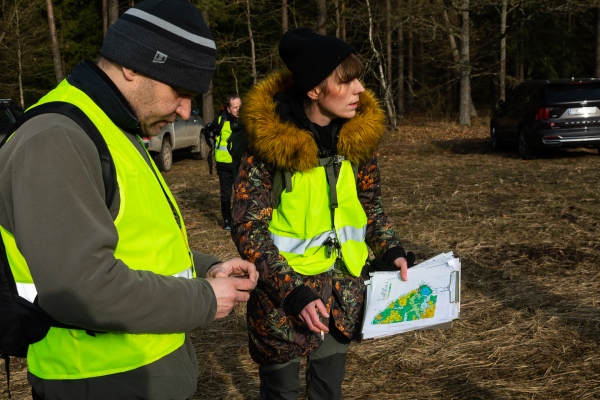
Photo (E.K.) : Searching for the body organized by local volunteers with collaboration of Police and Border Guards. February 16, 2023
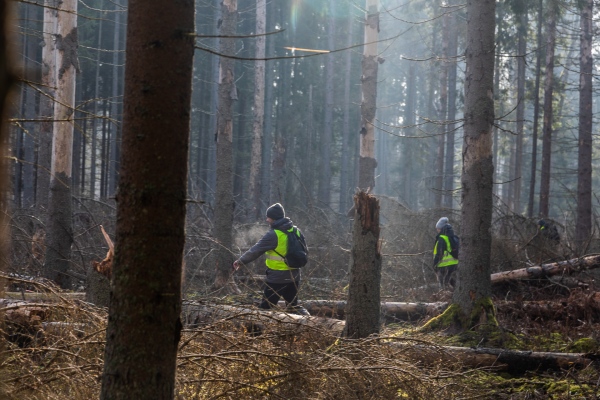
Photo (E.K.) : Searching for the body organized by local volunteers with collaboration of Police and Border Guards. February 16, 2023
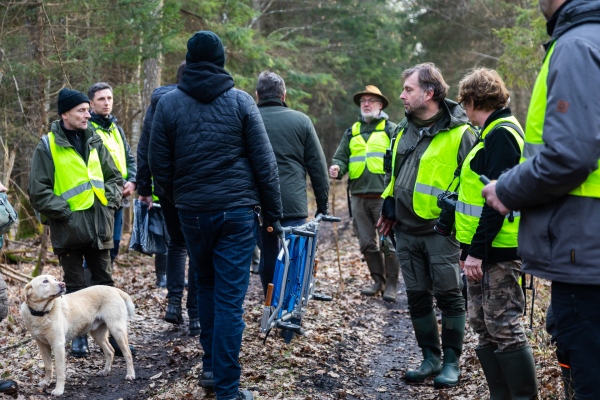
Photo (E.K.) : Searching for the body organized by local volunteers with collaboration of Police and Border Guards. February 16, 2023
Searching for Mahlet Kassa
On February 4, 2023, four people from Ethiopia, having crossed the Polish-Belarusian border, reached the vicinity of Hajnówka. There, due to the bad condition of the only woman in the group, two people set off in search of help. On the way, they knocked on the doors of the church, hotel, and court until they reached the building of the dairy plant, where they asked for help. The police were called there, and later the Border Guards. When the authorities had arrived, the refugees provided information about the critical state of their woman companion and indicated the place where to look for her. According to the testimony of the refugees, the Border Guards pushed them back to Belarus and did not undertake any further action to provide help to the woman.
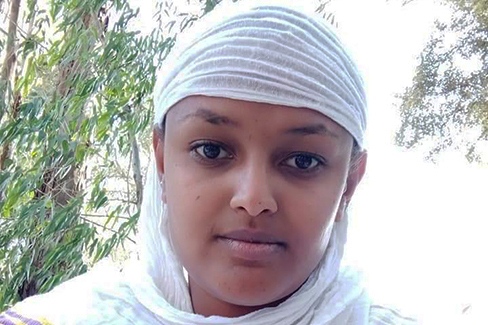
Photo: Mahlet Kassa (family’s archive)
On February 6, 2023, local volunteers conducted a search in difficult terrain with many trees and wet areas where two people in need of assistance were believed to be located. Unfortunately the search was unsuccessful, despite the team’s best efforts. Meanwhile, hospitals and centers for foreigners were also checked for any signs of the missing individuals.
Several days later, a third Ethiopian citizen was found beaten and unconscious on the Belarusian side. The volunteers launched a new search, and finally found the body of a woman huddled in the bushes near the road. She was identified by a sweater and hat from a photo in which she was wearing them.
It is tragic to think that this death may have been avoidable. According to refugees who accompanied the deceased woman, the Border Guards were notified about her critical situation but did not undertake any action of help. This is not the first time that such negligence has occurred, as was the case in February 2022 when the police failed to locate the body of a Yemeni refugee reported missing by his comrades.
Several days later, a third Ethiopian citizen was found beaten and unconscious on the Belarusian side. The volunteers launched a new search, and finally found the body of a woman huddled in the bushes near the road. She was identified by a sweater and hat from a photo in which she was wearing them.
It is tragic to think that this death may have been avoidable. According to refugees who accompanied the deceased woman, the Border Guards were notified about her critical situation but did not undertake any action of help. This is not the first time that such negligence has occurred, as was the case in February 2022 when the police failed to locate the body of a Yemeni refugee reported missing by his comrades.
Dozens of bodies are still missing, but unfortunately the recently introduced restrictions on entry to the vast areas of the Białowieża Forest may hinder the activities of volunteers who provide assistance and uncover the traces of this ongoing tragedy.
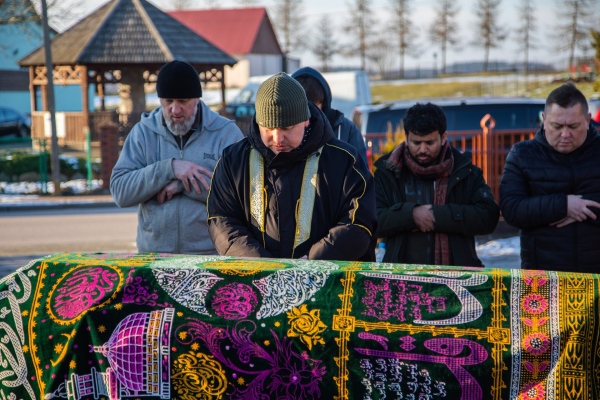
Photo (E.K.): Funeral of Ibrahim Jaber Ahmed Dhya. Refugees dead in the Bialowieza Forest are usually buried in the Polish Muslim Cemetery in Bohoniki, where the Tatars - a minority of Polish Muslims - have lived for more than 500 years. Bohoniki, February 9, 2023
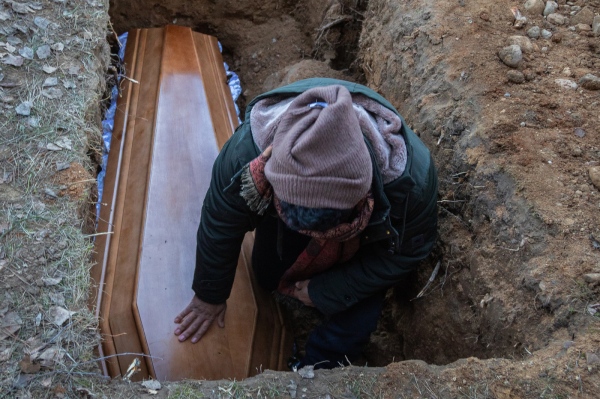
Photo (E.K.): Mohmmad, the brother of Ibrahim, at the funeral of the latter. Bohoniki, February 9, 2023
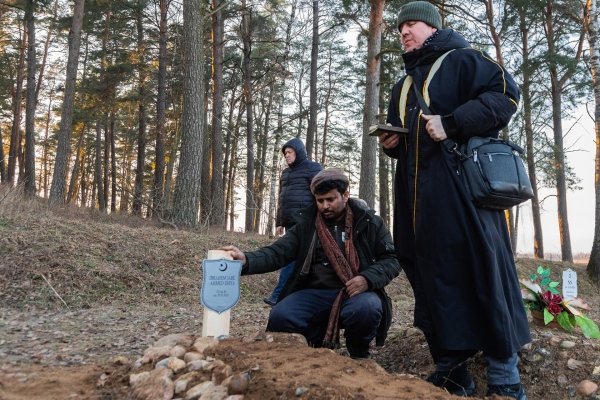
Photo (E.K.): Mohmmad, the brother of Ibrahim, with an Imam from Polish Muslims’ community. Bohoniki, February 9, 2023
Ibrahim Jaber Ahmed Dhya is another victim of the ongoing crisis at the Polish-Belarusian border. A doctor from Yemen, a country that has been at war for more than eight years and where nearly 400,000 people have lost their lives. At the age of 36, Ibrahim died on January 7th 2023, likely after crossing the Przewloka River with a group of other refugees. He left behind his wife and three children.
After receiving information from his apprehended colleagues, it was the Border Guards who discovered Ibrahim’s lifeless body.
The Przewloka River and its surroundings are particularly challenging to navigate due to swamps and fallen trees. With no communication network available, seeking help is nearly impossible. HOwever, as this part lacks a border wall, many refugees attempt to cross the border there. The weather conditions at the time of Ibrahim’s death made the journey even more perilous, with snow and frost increasing the risk of illness and death.
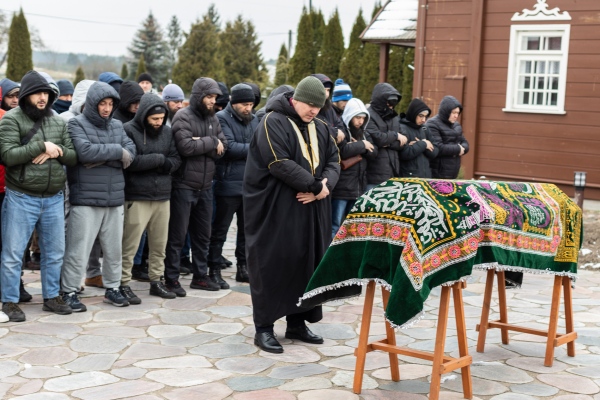
Photo (E.K.): Funeral of Sidding Musa Hamid Eisa from Sudan. Bohoniki, December 5, 2022
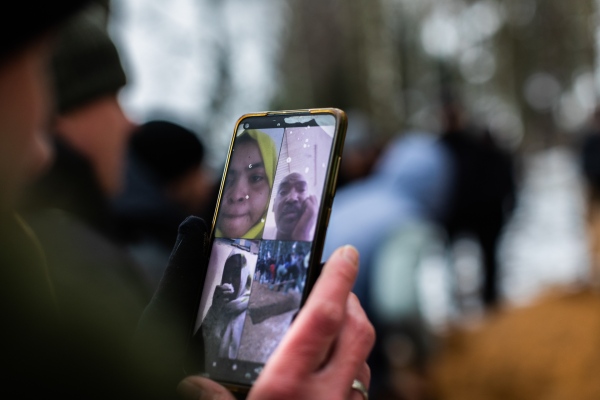
Photo (E.K.): The deceased's family attending the funeral via videocall, Bohoniki, December 5, 2022
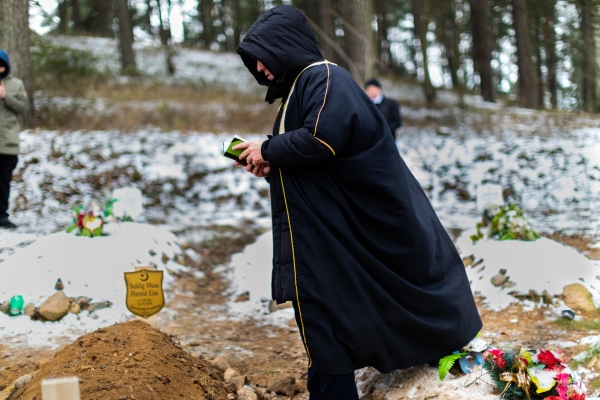
Photo (E.K.): Funeral of Sidding Musa Hamid Eisa from Sudan. Bohoniki, December 5, 2022
PENALIZATION OF HUMANITARIAN AID
Photos & texts - Hanna Jarzabek
The Polish government has penalized humanitarian aid at this border since the beginning of the refugee crisis. As a result, unlike at other borders, there are no refugee camps here and the absence of humanitarian organizations is striking.
Regarding the policy of the Border Guard towards volunteers who help refugees, it ranges from direct intimidation to attempts to accuse them of human smuggling. In the latter case, the Border Guard tries to interpret the mere presence of volunteers in the forest with refugees as proof, ignoring the fact that the former provided help in the form of food, water or clothing. Sometimes, volunteers also provide refugees with phones because the Border Guard often destroys them during push-backs. Leaving a person without a phone in the Białowieża Forest exposes them to the risk of death, therefore providing a working phone fits perfectly within the concept of humanitarian aid. However, the Border Guard tries to use this as evidence of a possible connection with human smuggling networks.
In March 2023, the Border Guard announces its intention to initiate proceedings against two volunteers, accusing them of alleged involvement in human smuggling. This crime, according to the Polish Penal Code, is punishable by up to eight years in prison. Currently, formal charges have not yet been presented, but the first interrogations have already taken place, which were full of irregularities and intimidation. (For further details: click here).
The volunteers and their lawyer contend that there is no evidence to support the allegations against them. They assert that it is either an attempt to intimidate them or an effort to stage a show trial to generate more pressure. The Polish government maintains that the wall built on the Polish-Belarusian border has resolved the refugee problem, so the work of volunteers is increasingly challenging this thesis, both in terms of humanitarian aid and information dissemination.
“At the outset of this humanitarian crisis, I do not recall any repressive action taken against us by the authorities. However, this began to change between October and November 2021. Starting from that time, some individuals, such as Jakub Sypiański (a historian and volunteer at the border - editor's note), were brutally treated by WOT (Territorial Defense Forces) personnel, and there was a raid on the base of volunteers at the Catholic Intelligentsia Club. These actions by the authorities became increasingly repressive from autumn 2021 to spring 2022. After that, the situation somehow calmed down, and the entire summer and the beginning of autumn 2022 were relatively peaceful. In July, the no-entry zone was limited to 200 m from the border, although there were flying check-points in various places, which was inconvenient for both residents and anyone moving around Podlasie. But overall, the situation was peaceful. However, in the fall of 2022, the situation began to gradually deteriorate again.
Situations in which soldiers suddenly jump out at activists in the forest shouting the command "Fall dawn!" followed by the sound of a gun being reloaded are commonplace. Another time, in winter, my friends provided assistance to one person in the forest who was barefoot and in a very bad condition. The Border Guard found them by following tracks in the snow and accused them of human traffic. The officers also attempted to take their phones. When one of my friends made a comment, she was handcuffed. Another officer eventually intervened and released her, but this situation was inacceptable and such incidents should never happen. It appears to be an attempt to intimidate us because the wall has already been built, and the electronic installation is complete, therefore, they need to show that they are in control of the situation. Our aid, besides providing direct humanitarian assistance to people, also serves an informative purpose. We aim to keep the public informed about what is happening here and about the violations of the law. We also emphasize that the wall is ineffective and a waste of taxpayers' money. This, of course, is inconvenient for them." – says Aleksandra Chrzanowska, a volunteer of Grupa Granica.
The smuggling cases that were brought against volunteers have been dismissed by the Polish courts. Moreover, there have been the first court rulings confirming the illegality of push-backs. However, according to the volunteers, the decision to bring new cases against them by the Border Guard depends largely on the political situation.
Read more:
Helsinski Foundation for Human Rights rapport (31.01.2023): ENTER
Interview with Jakub Sypański by Amnesty International (in polish): ENTER
Interview with Aleksandra Chrzanowska about her experiences with interrogations: ENTER
Photo above: A volunteer brings clothes and food to refugees hiding in the forest. Sometimes volunteers have to go in the middle of the night and get to places that are extremely hard to reach. November 1, 2022
MILITARIZATION
Podlasie is a region famous for its peaceful, idyllic life surrounded by climatic, wooden rural buildings. A great asset is the valuable nature, especially the area of the Białowieża Forest, a UNESCO World Heritage Site. Preserved fragments of an ancient primeval forest, rich fauna and flora are unique and valuable features. The exceptionally green region, called the lungs of Poland, with its beautiful landscapes attracted many visitors. Multiculturalism is another advantage of this place.Due to this uniqueness, tourism is the most important branch of the economy in this region, which has been developing very dynamically for many years and offering an increasingly wider offer. It is the main source of livelihood for many residents.
Since the crisis on the Polish-Belarusian border began in 2021, this peace and image of the region has been ruined. The entire border area was militarized, restrictions were introduced, villages were closed, creating zones inaccessible to anyone from the outside. From September 2, 2021, a state of emergency was first introduced, which lasted 90 days, and from December 1, 2021 to June 30, 2022, a ban on staying in 183 towns was introduced. Many places could be entered only with the written consent of the Commanders of the Border Guard, residents were checked each time they entered their towns. Police and military checkpoints were set up on the entry roads and every vehicle and every person was checked in detail, not once hearing offensive comments such as: “are you giving a lift to Ahmed?”, “is there anyone in the trunk?”, “have you seen the chumps (derogatory word used in Poland for those with darker skin)”?
The atmosphere was very tense and unbearable for citizens accustomed to freedom and liberty. Especially since most of the country a few kilometers away lived normally. Cavalcades of cars on light and sound signals have become an everyday reality. People on walks in the woods were initially treated as criminals, often saw guns pointed at themselves (read & listen to the testimony of a local resident) or heard unpleasant comments. The inhabitants were locked up in their towns turned into barracks. The military occupied sports fields, stadiums, parking lots and even playgrounds to set up military tents and equipment. The police stayed in the hotels. There were more uniforms than civilians walking the streets. Soldiers entered shops with rifles, drove with great speed through the villages, parked where they wanted, regardless of any signs or prohibitions.
When the construction of the wall began, trucks loaded with steel and sand arrived. Forest roads in the most valuable forest in Europe were run over (read more about the impact on nature), local roads were also destroyed. Military equipment appeared in the form of Wolverines and Hummers, helicopters flew over the houses day and night. The beautiful, peaceful region turned into a military training ground. People lost their source of income overnight, the villages looked like extinct, the tourist life ceased to be vibrant.
The worst thing about all this is the people in the forest begging for help - the residents were left alone with it. No aid or medical organizations could enter, no aid activists. The entire burden of humanitarian aid fell on the local population (read the testimonies of local residents). They became rescuers overnight, they had to learn how to do it, know the law and organize themselves together. For this help, if it was revealed, there were persecutions, and these life-saving actions were publicly penalized (more about penalization here) by the authorities using their media, creating their own narrative. The helpers were and still are called spies, traitors, idiots. The president of Poland himself uses such terms.
On July 1, 2022, after lifting the ban on staying and completing the construction of the barrier at the border, the number of uniformed officers decreased slightly, but there is still a long way to go before returning to normal. How to offer peace and rest with such an image? How to restore lost time, freedom, money and nerves to the inhabitants? When will the brand of Podlasie, developed over the years, be rebuilt? When will the military finally leave and let people live normally? And yet the crisis is still going on and the wall did not bring the intended effect, only the health of the refugees deteriorated (read about the medical situation on the border) due to the injuries they suffer when falling from the wall.
Text and photo above: Eliza Kowalczyk
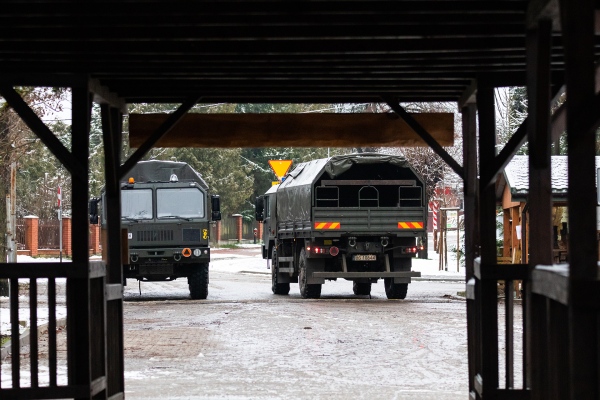
Photo (E.K.): Army presence in Bialowieza, one of the most touristic places in the Bialowieza Forest. January 20, 2023
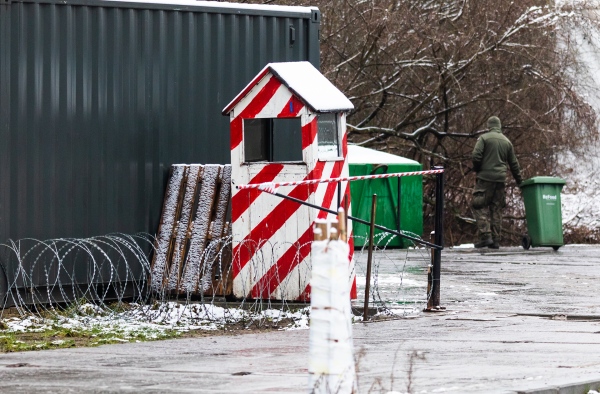
Photo (E.K.): Army presence in Bialowieza, one of the most touristic places in the Bialowieza Forest. January 20, 2023
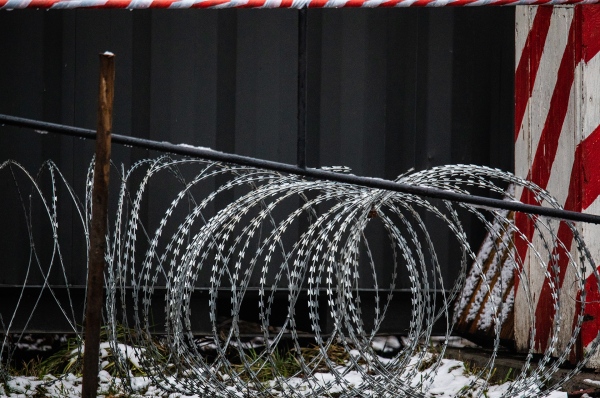
Photo (E.K.): Concertina at the military unit in Bialowieza. January 20, 2023
TESTIMONY FROM A LOCAL INHABITANT
Text, photos & audio: Hanna Jarzabek
GOSIA (50 years old)
"I have lived for twenty years on the south-western edge of the Białowieża Forest and it is my... my paradise on earth, the perfect place where I simply felt that this was my place, that I belonged to it, that it belonged to me and until the crisis I felt like I was living in paradise and I was the happiest person in the world. The Białowieża Forest itself is like my sanctuary. I have been photographing its beauty for several years and promoting the uniqueness of this place.
Until the year 2021 came. Here, in the Białowieża Forest, everything began close to Białowieża village. The first situation with refugees took place in a strict reserve. And after it came to us. The zone was declared and a large number of troops appeared.
It's like the army has invaded our lives. They showed up and ran rampant. They went everywhere. I felt so oppressed that even going out in my own backyard in the evening when it was dark was a huge stress. Why? Because of the helicopters that were circling low over our heads, in my own backyard; drones flying above us. Herds of troops with weapons that were rolling there at that time. 50 meters from my house, they set up their camp. They were burning fire, they were loud. At first, I was very annoyed that they were littering my forest, so I walked, collected garbage, and tried to talk to them. I put a pot of water for them to use as an ashtray. I was walking in the woods and the frustration grew because it was all about such destruction. It's about roads, about not respecting nature, tree felling. In general, total arbitrariness works and nothing could be done about it.
I live in a place where, apart from us, there is no inhabited house within a radius of several kilometers. It's just us. We were cut off from friends, from everyone. No one could come to us without a suitable permission. In fact, no one even tried to get it. I felt so isolated from the rest of society that I remember it as a nightmare. I felt surrounded on all sides.
Since the zone entered, the sounds from the border to this day torpedo us. They are not as intense as a year ago. However, they did not end at all. There were messages from loudspeakers on military and Border Guards cars, in several languages. Through the forest it carries a lot. Initially, they did not use the border road, because there was no border road yet, so all these military and Border Guards vehicles drove past our house.
Update Required
To play the media you will need to either update your browser to a recent version or update your Flash plugin.
LISTEN TO THE PODCAST (polish) - GOSIA
Wolverines have appeared. These are armored fighting vehicles. And our road was virtually destroyed in one night. There were no sounds at the border at that time that would indicate that anything was going on there, that there was a passage. But the Wolverines rode back and forth all night. These machines also make noises that always woke me up. Yes, this is noisy equipment, especially since the gentlemen felt like they were on a training ground, because they accelerated to the maximum. That was my impression, I don't know. I didn't look at the odometer but they were driving very fast and carelessly.
The road was so mangled that at one point it was impassable to use it. My child was unable to go to school for a month because of it. On the one hand, I felt indignation that it is sick that the kid cannot get to school. On the other hand, I felt grateful that she did not go to school, because at school it was the time when children were forced to paint cards for soldiers. It was also the time when those desperate refugees came to my house and asked for help. My child is clever enough to know she couldn't talk about all this, that it was a family secret. But she felt guilty for making those cards. She told me: you know, Mamy, I drew a poor little refugee on one card. Maybe someone will see, maybe someone will react.
When it comes to what was happening at school, I was really angry about it. Half of the school was affected by the army. They occupied the stadium, putting tents outside and a field kitchen. The soldiers occupied the gym. My child during the classes of physical education couldn’t use the gym so the teacher was taking them either to the forest or they exercised on the sidewalk in front of the entrance, because there was no room for them elsewhere.
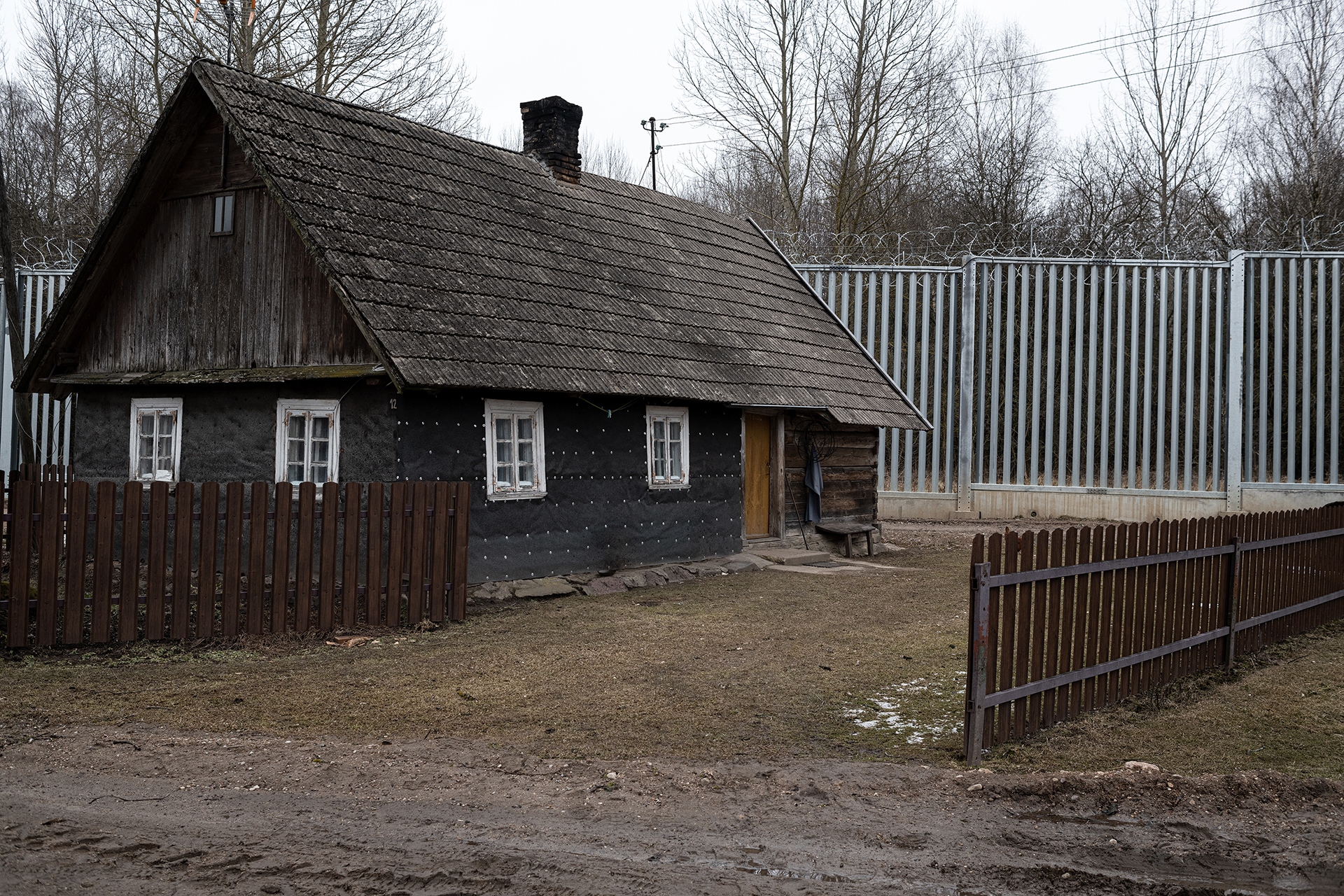
Photo (H.J.): One house in Tolcze, a village near the border. A wall has been built just a few meters from this house, and the family of an elderly man living there has been fighting to prevent the authorities from demolishing it. March 9, 2023
I remember such a situation at night, I haven't slept yet, it was around 2 am and I saw Border Guards approaching. A truck pulled up 30 meters from my house. And I had the impression that the truck came to pack people and take them to the border. And I thought to myself: no, I won't be afraid, it's not a bad thing if I go out and ask if I can give these people something to eat and water, or at least a hot tea. I put on a white blouse. The light was on in the house, so you could see that life was going on here. I didn't even manage to leave my yard well when I heard: "Oh, the son of a bitch in a white blouse is coming."
I looked at myself, and saw that dots were running around me to track targets. And I saw a group of young soldiers in front of me. Not exactly soldiers, because they were from WOT (Territorial Defense Army - special units, created by the current government, where any person can enter after a short instruction period). Besides, soldiers, not soldiers. It was definitely not a professional army, from which I would expect more professional behavior. And they run to me. They stop 3-4 meters in front of me, constantly aiming at me. My legs felt like jelly, they buckled under me. I started yelling at them. What are they even doing? How do they behave? They started apologizing to me and I heard that they thought it was, I don't remember what expression they used, whether refugees or, it doesn't matter. Anyway, I asked them: “But what if people pass by? They don't have weapons, they're exhausted, and you aim your guns at civilians, at every civilian you meet in the forest?" Of course, I didn't get an answer to this question, but from that moment on, I couldn't go out without fear. I couldn’t control it. As a matter of fact, I stopped going to the forest alone. If I went to the forest, I always asked my husband to go with me, because I did not feel comfortable. Maybe in September this year I dared to go for a walk in the forest alone for the first time with a camera, because earlier I felt such discomfort and such fear not in front of people who were crossing from the Belarusian side. I was afraid of our soldiers.
It wasn't the only situation that happened to me. The last time I had such a situation was on November 12 2022, when once again a soldier, this time it turned out to be a professional soldier, aimed his gun at me again. As I said, for a long time I was afraid to go out into the forest alone, since September I overcame this fear and went to the forest with the camera during the day, and on my way back I heard someone talking on a walkie-talkie and I saw a soldier. I stopped on the road for him to see me because he was in front of me so he would see me sooner or later. So I stopped as I did not want to have any strange situation, I stopped and suddenly, to my surprise, when this man saw me, he immediately aimed a long gun at me and shouted: "Stop, I'm shooting, stop, I'm shooting!" I was in total shock. I shouted to him to let him know that I was Polish: "Boy, take your finger off this trigger, you're aiming at a civilian, you're aiming at a Polish citizen!" As if he didn't care, he kept walking straight at me shouting: "Stop, or I'm shooting." I couldn't believe what I saw. And I got angry. He was aiming a gun at me, I had a camera with me, this is my gun, so I picked up the camera, I started taking pictures of him, I started shouting at him that what is he even thinking, how dare he, I'm a resident here I'm going to forest and he attacks me with a weapon. He hears that I'm Polish because I speak Polish, and he points a gun at me? And he's telling me to fuck off. Well, I'm 50 years old, the boy, I don't know, 35 years old maybe… a professional soldier. I turned on my heel and told him if he was brave enough, he could shoot me in the back. Me, I’m gonna go home." - Gosia
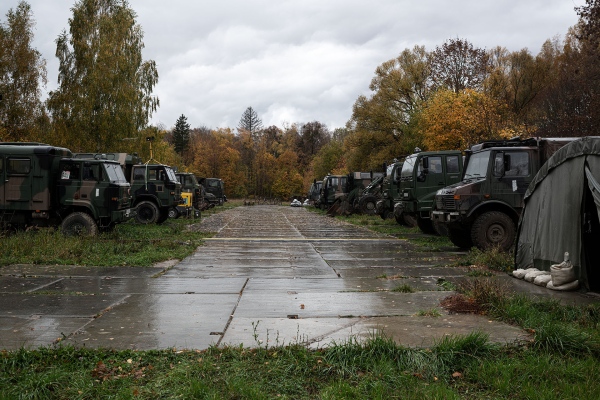
Photo (H.J.): Military cars – since the crisis broke out on the border with Belarus, the presence of the military in the area has increased significantly; Bialowieza, October 19, 2022
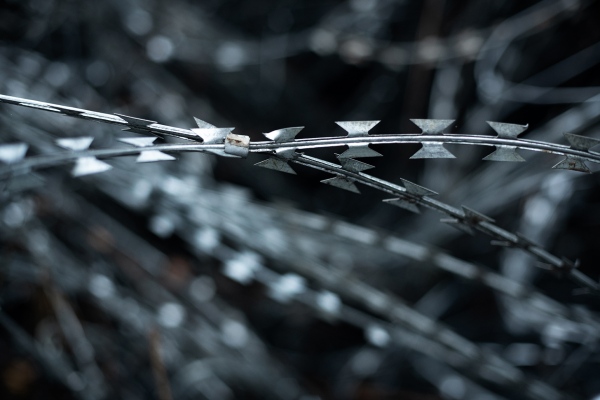
Photo (H.J.): Concertina that, at the beginning of the crisis, served as a separation between Poland and Belarus before the fence was built; now the same type of concertina is placed on top of the anti-immigration fence; October 23, 2022
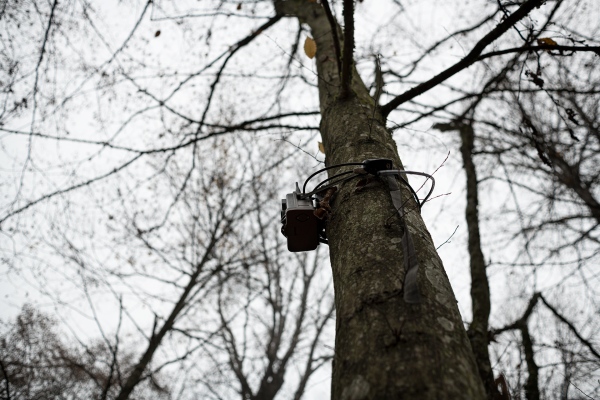
Photo (H.J.): One of the photographic traps placed by the Polish Border Guards in the Bialowieza Forest to monitor the migratory flows of people; November 1, 2022
THE WALL & NATURE
Photos & texts
Hanna Jarzabek & Eliza Kowalczyk
The Białowieża Forest, located on the Polish-Belarusian border, was inscribed on the UNESCO World Heritage List, which made it a common good of humanity. Initially, only the Polish part of the area was inscribed on the World Heritage List in 1979. The Belarusian part of the Białowieża Forest was added in 1992, which makes both parts of the Forest a single cross-border facility. The inscribed area covers an area of 141,885 hectares. From the point of view of preserving biodiversity, this place is unique.
The Białowieża Primeval Forest contains the best-preserved fragments of lowland deciduous and mixed forests in the European Plain, in which, in a large area (also outside the national park and nature reserves), natural processes, undisturbed by direct human intervention, take place, covering all stages of the dynamics of the forest ecosystem. The largest population of the European bison, a species that has become a symbol of this region, is found here, as well as many very rare species, such as the three-toed woodpecker, the cinnabar crusher and the pygmy owl. Various types of scientific research have been carried out in the area of the Forest for decades, precisely because of its uniqueness and the possibility of observing natural processes. There are such institutions as the Institute of Mammal Biology of the Polish Academy of Sciences, the Geobotanical Station of the University of Warsaw, the European Center for Natural Forests of the Forest Research Institute and the Research Laboratory of the Białowieża National Park. The research was also international in nature and there was close cooperation with the Belarusian side because a broad coverage of the entire facility of the Białowieża Forest on both sides of the border in the research was crucial for scientists.
In 2021, the migration crisis began on the Polish-Belarusian border and its consequences affect now and will probably affect the natural environment so valuable here for the next few years. The construction of the barrier was a huge investment, during which heavy equipment was used, various types of materials were transported, roads were widened and nature was devastated. Due to the increased traffic of vehicles, noise and other features accompanying the construction and transport, the processes natural for this area have been interrupted. Were possibilities of other solutions sought, or were specialists consulted? How were the effects of the investment mitigated? We also asked specialists from scientific institutions dealing with the Białowieża Forest on a daily basis in their scientific work what impact does the barrier have on nature and what may be the consequences of its erection in the coming years.
Text: Eliza Kowalczyk
Photo above (H.J): The anti-migration fence, with a height of 5.5 meters and a length of 183 kilometers, recently built by the Polish government on the border between Poland and Belarus. Klakowo, March 11, 2023
"I don't think that there was any effort when it comes to ways of considering how the impact of the wall might be mitigated at the environment or human communities level. I was mentioning the US-Mexico border. It is true that the environmental context at the US border wall is different than here, but still one could compare both situations, draw basic conclusions and prepare better for the wall’s construction here. One researcher in Montreal, Elisabeth Vallet, who works on border walls, says: "walls are a good way to do nothing while looking like you're doing something". They took inspiration from that and said, let's build our own barrier. Even when the evidence shows time and time again that walls do not deter people, that walls increase the probability of human trafficking or the use of more dangerous routes.
I think it's not only an abomination to the Bialowieza Forest, which is this crown jewel of Poland and Europe and the world. The European Commission has now turned a complete blind eye to the situation which shows to me that they accept this wall on the eastern border of the European Union. We should talk about this wall as not Poland's wall, but the European Union’s wall, really.
Also when you think this place is a UNESCO's World Heritage, you can be really excited about coming here where you have this amazing old growth forest that still remains and it's very sad to see it brutalized or disrespected in the way that it has with the construction of this wall.
From a human perspective, I never thought that my country, who has also experienced asylum seeking and the Polish diaspora spread all across the world: everywhere I I've gone in my life, I've met Poles, whether it's South Africa or Canada or wherever, well I never thought that we would behave in this way towards people running away from a bad situation. So it's very hard to accept.
I came here for the first time in October 2021, so I'm very new here. Just at the beginning, I think this was my second time ever in the Bialowieza Forest. I was with someone from the station collecting fungi and we had parked the car, which had Warsaw plates. Suddenly we saw a group of people, just ten people running away through the forest. And behind them were soldiers. And we happened to be in this place at the same time. And so the soldiers approached us with their faces covered on, with their weapons partly raised thinking we were helping this group of refugees who were running away, especially since our car was just parked right here. And so we had to put our hands up and then they marcheed us over to the vehicle and we showed our papers and explained that we were there to collect fungi, which sounded ridiculous probably at the time. In the middle of October 2021 when there were 16,000 attempted crossings and we were collecting mushrooms… The soldiers let us go and when our car passed later on, some of the people in that group that were running away were now sitting on the side of the road. The military had taken them into custody. There was one woman with a small baby there and I remember making eye contact with her. I'll never forget that moment of seeing this young woman clutching her baby on the side of the road. For me, the forest has always been filled with people since it's just been a year that I've been here. But it doesn't make it any easier.” - Katarzyna Nowak, a scientist at the Geobotanical Station in Bialowieza.
Photo (E.K.): Bialowieza Forest, January 3, 2023
Text: Hanna Jarzabek
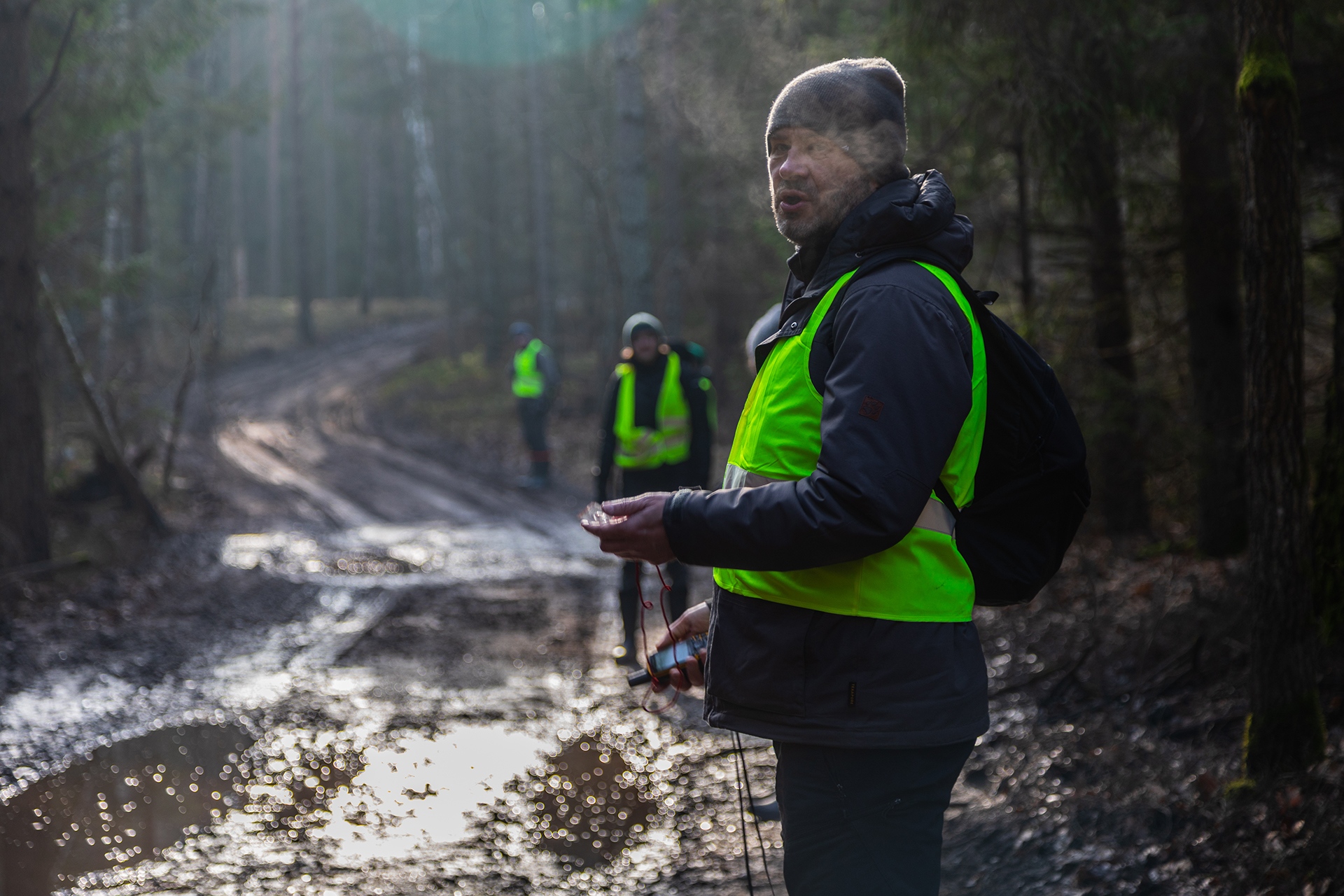
"The use of razor wire has sparked controversy worldwide due to its lethal impact on both animals and humans. It has been described as a “brutal approach to border protection.” As a result, the scientific community and environmental organizations have voiced strong opposition, citing the significant threat it poses to various animal species, including protected ones like wolves, lynxes, and European bison. These fences not only act as barriers to animal migration but also become deadly traps, particularly when placed along the banks of border rivers. Our institute has been called upon twice to rescue a deer and an elk entangled in the wire. Animals easily get caught in the sharp edges of the razor wire, resulting in cuts to their skin, muscles, tendons and blood vessels. In their desperate attempts to free themselves, the animals struggle, further exacerbating their injuries. Ultimately, these animals perish in agonizing pain" - Rafal Kowalczyk, former director of the Mammal Research Institute of the Polish Academy of Sciences
Photo (E.K.): Rafal Kowalczyk in the Bialowieza Forest, February 16, 2023
Photo below (H.J.): The anti-migration fence, Krynki, October 26, 2022